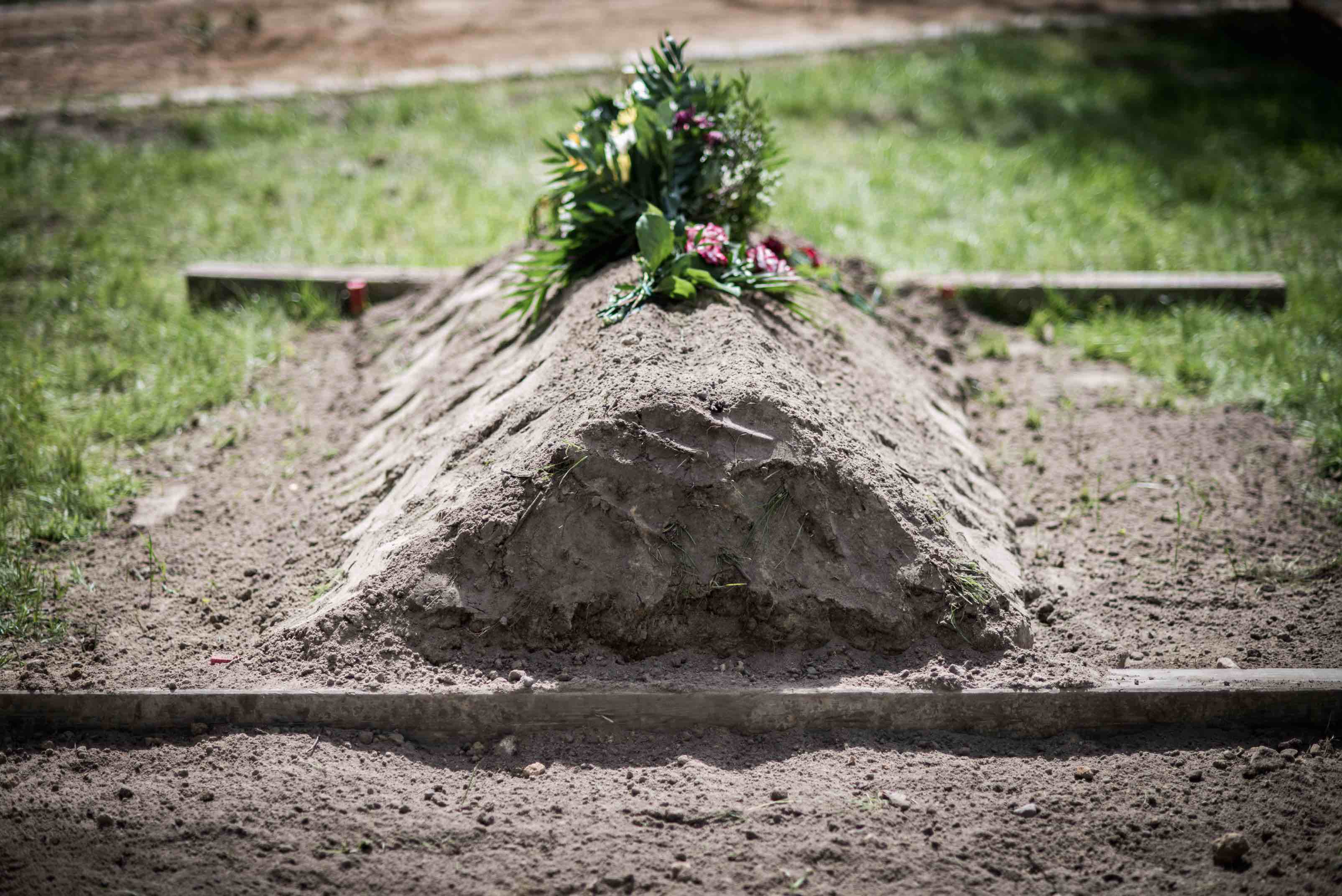

Every day, hundreds of migrants die at Europe’s aggressively sealed-off borders. These borders are the world’s deadliest. Year after year, thousands of people die trying to cross them. The victims of this cordon sanitaire are buried in masses in the hinterland of Southern European states. They have no names. No-one looks for their relatives. No-one brings them flowers.
The Center for Political Beauty took these dead immigrants from the EU’s external borders right to the heart of Europe’s mechanism of defense: to the German capital. Those who died of thirst or hunger at our borders on their way to a new life, were thus able to reach the destination of their dreams beyond their death. Together with the victims’ relatives, we opened inhumane graves, identified and exhumed the bodies and brought them to Germany.
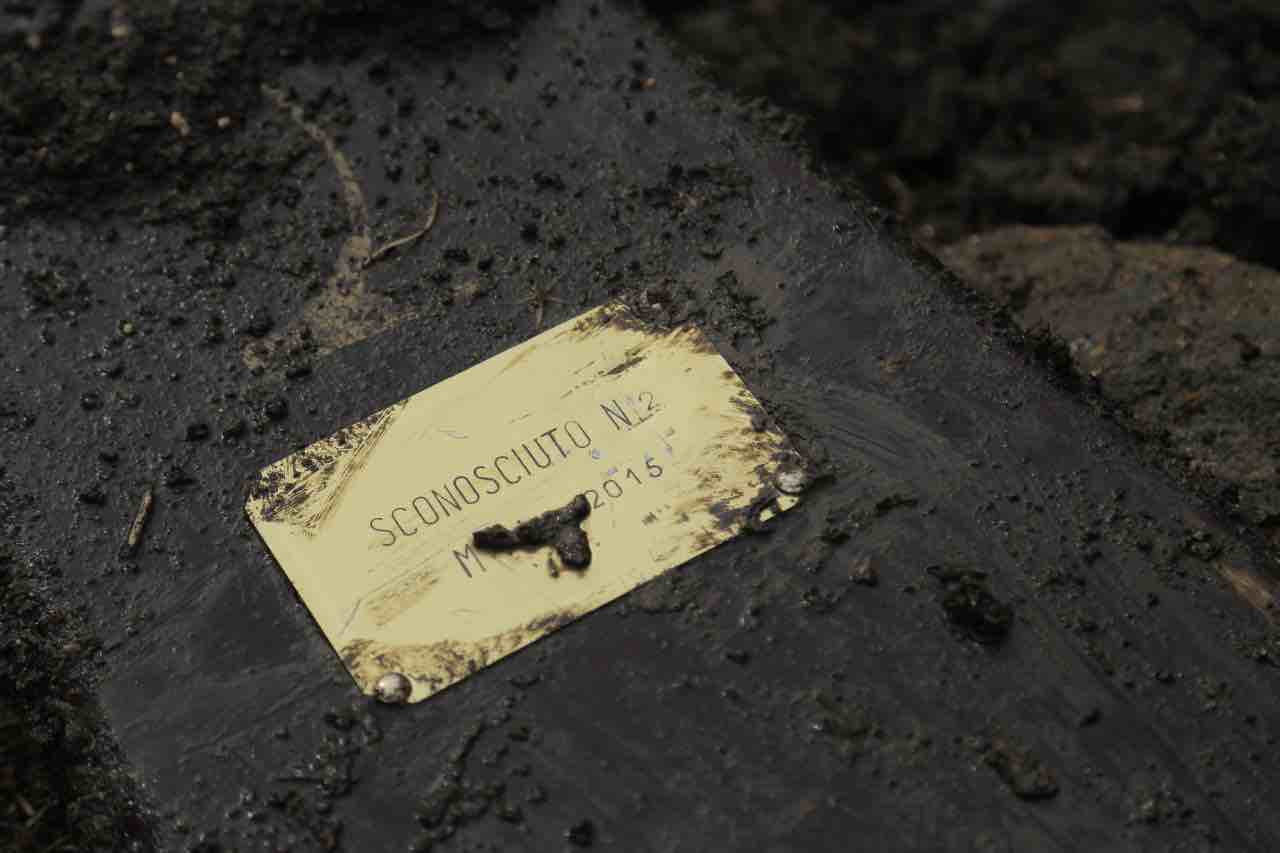
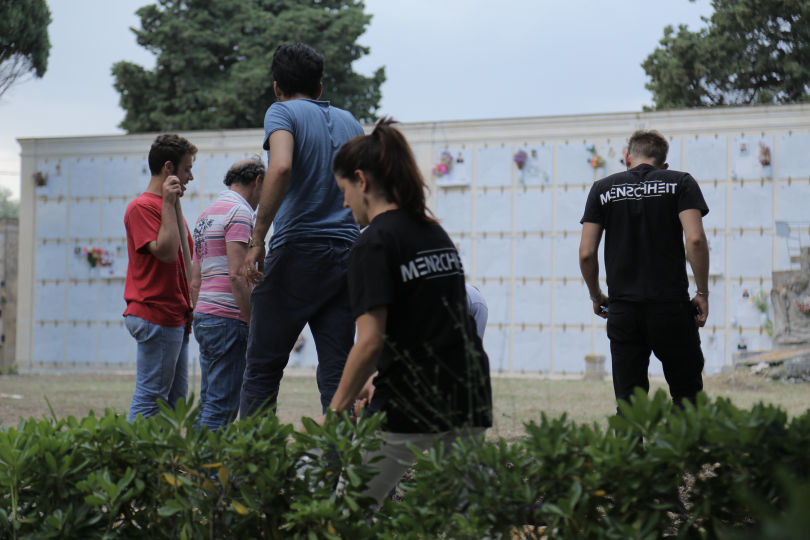
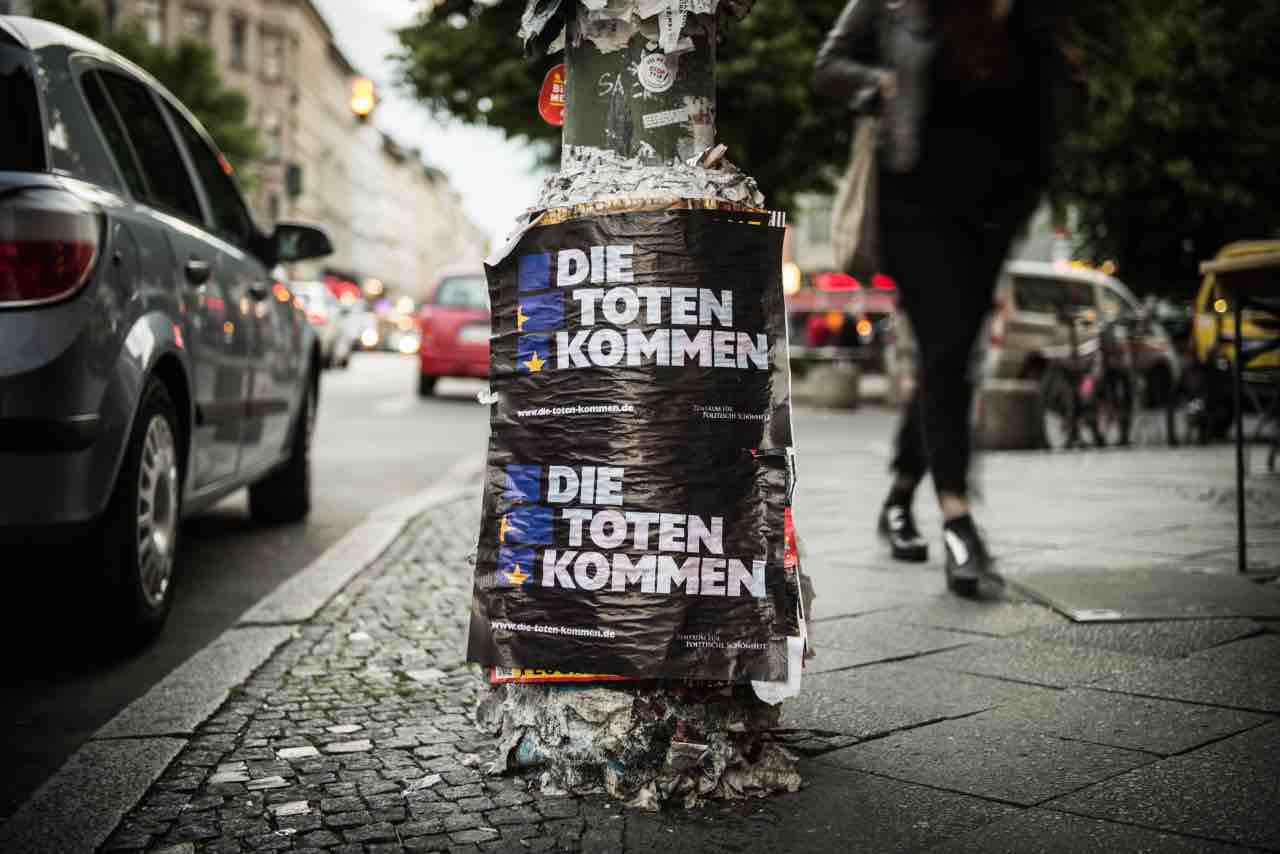
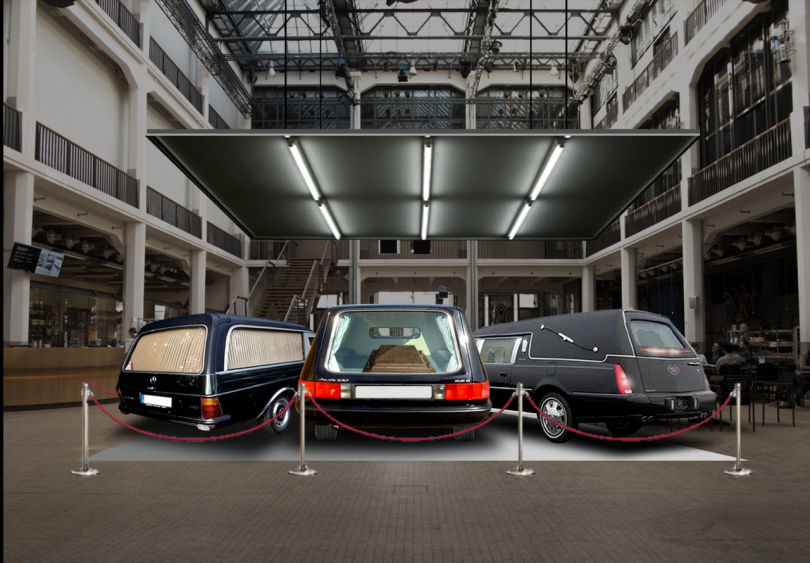
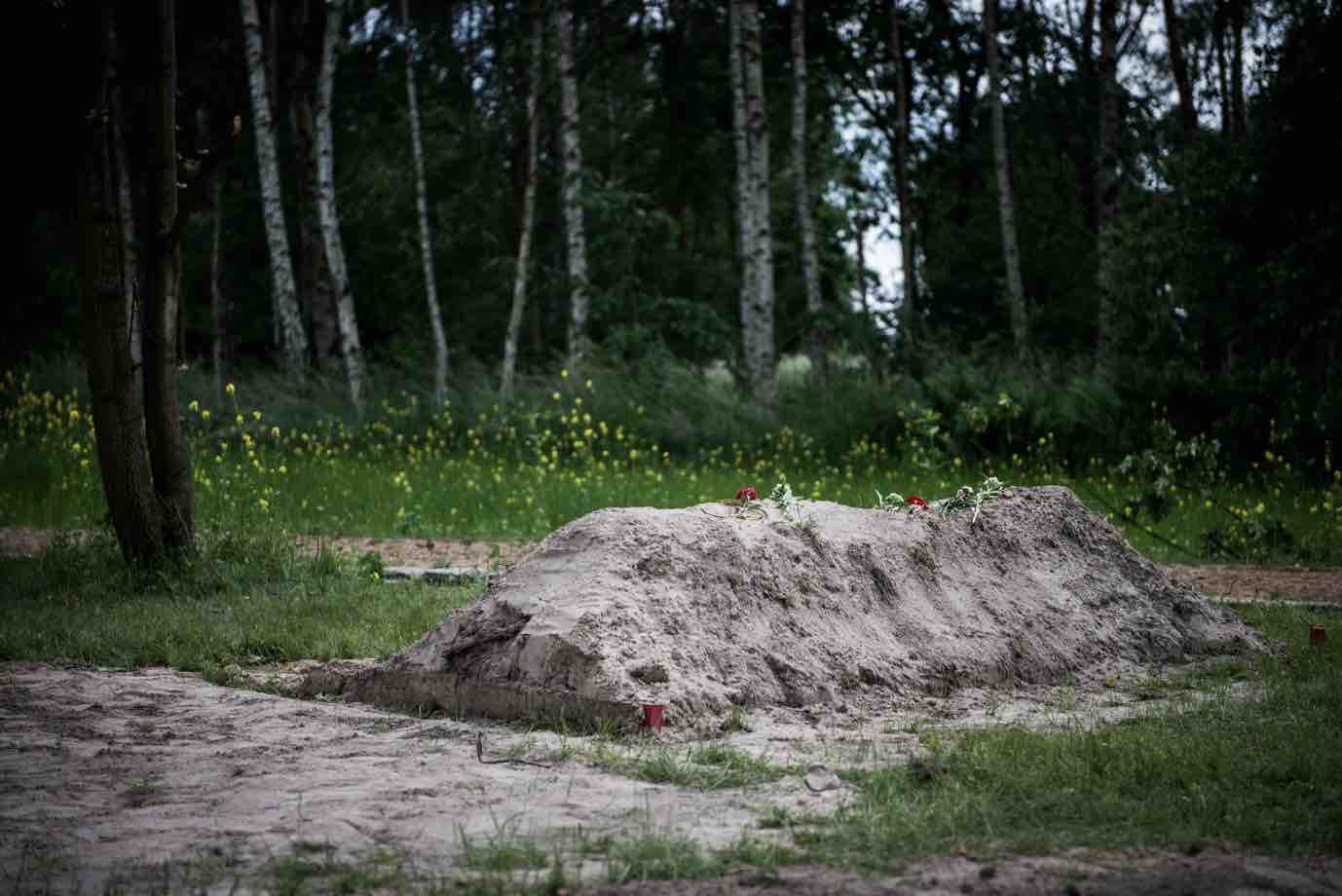
Against every rule of probability, we exhumed a mother who had drowned on her way to Europe - due to our inaction - and was buried as »unknown« by the authorities in Sicily. We took her to her loved ones in Germany. We were not allowed to bury her two-year-old child with her. Instead, we managed to free a sixteen-year-old from the shackles of bureaucracy. He had collapsed on the trip of horror on the Mediterranean and his body was confiscated by the authorities for ten weeks in order to get his relatives to testify against their smuggler. We gave these migrants the dignity they deserve. But it was not just about saving their dignity.
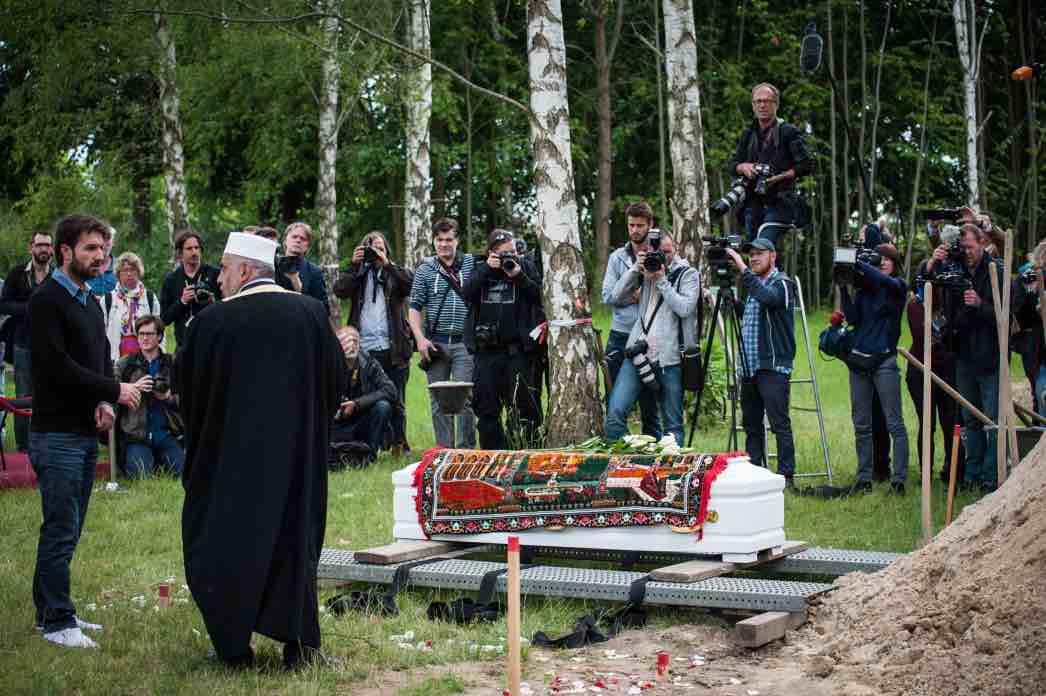
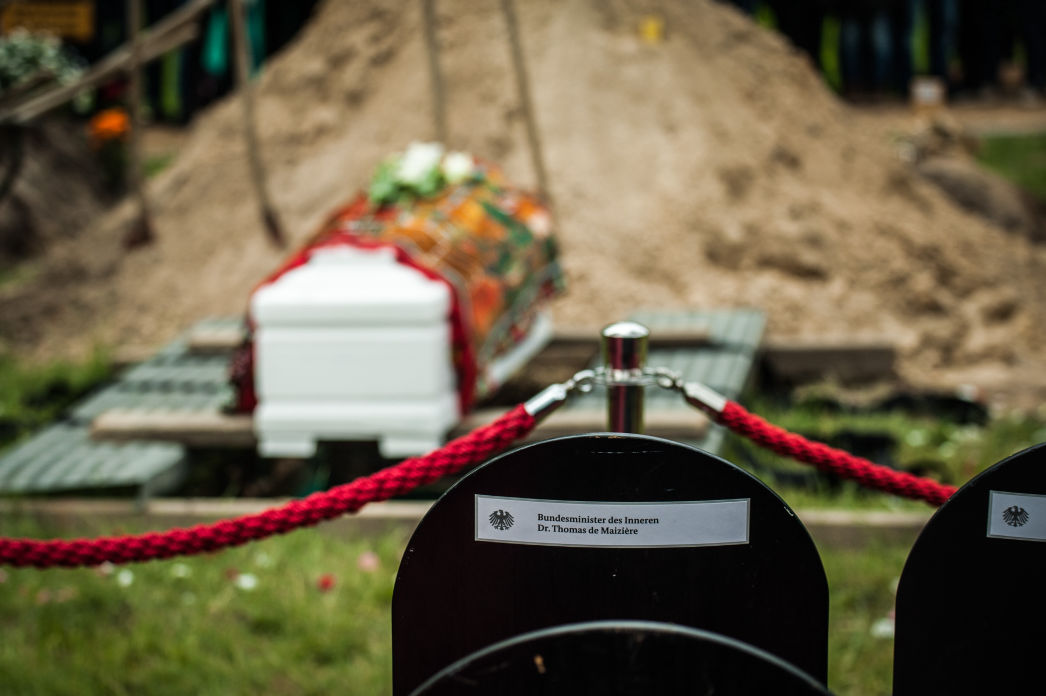
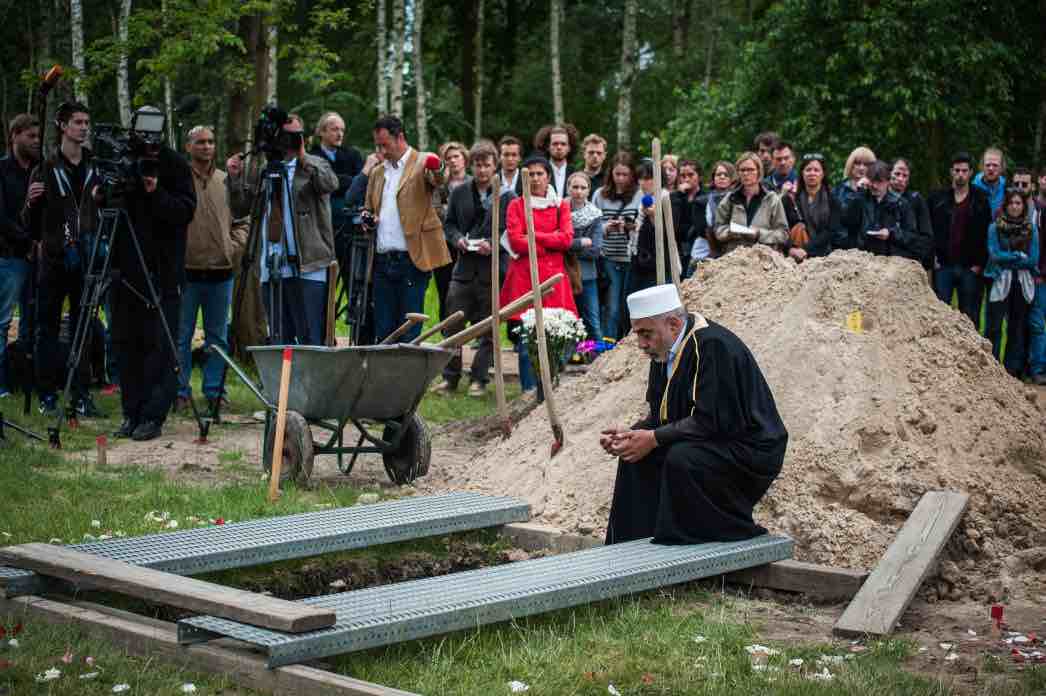
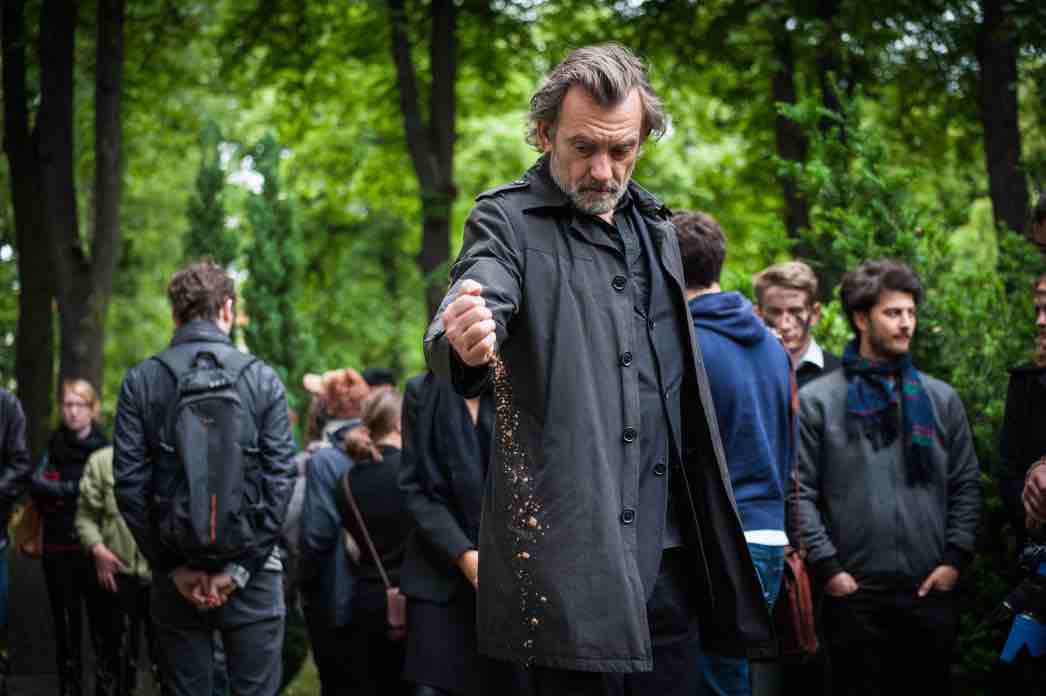
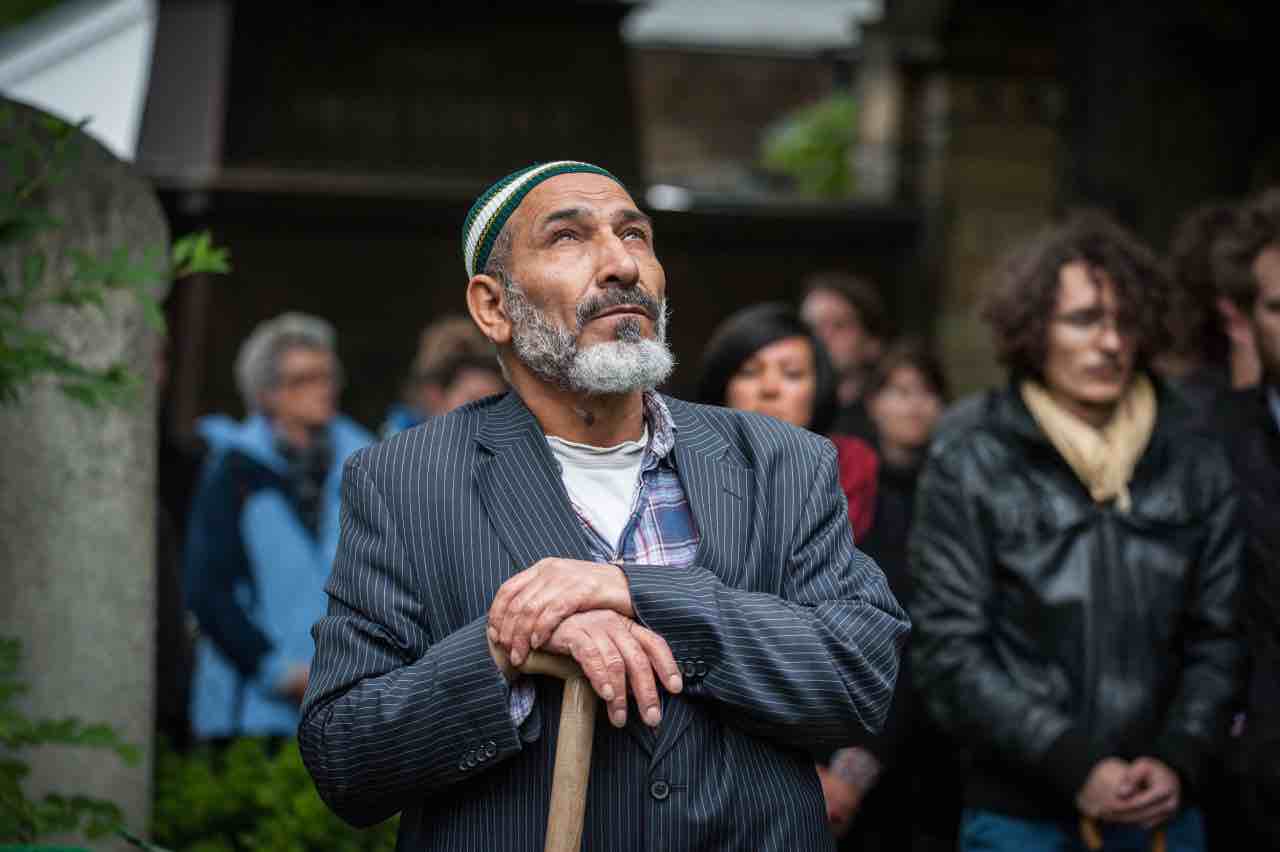
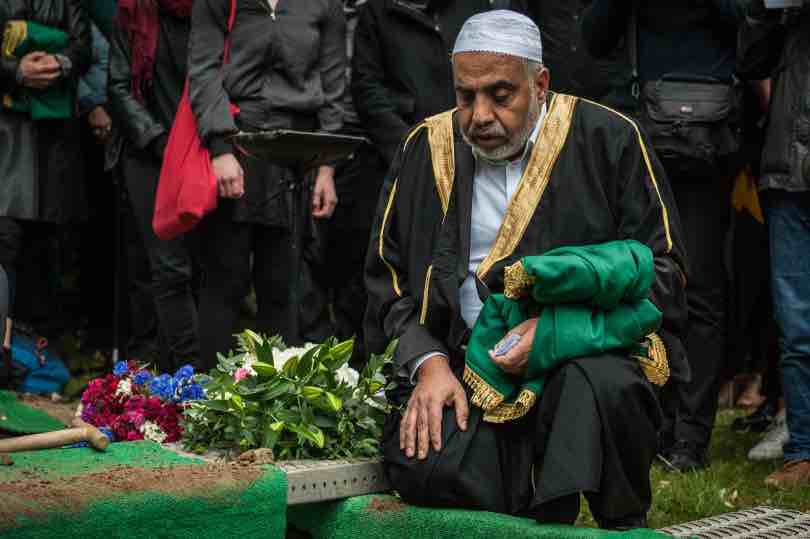
»The most radical interpretation of Sophocles’ ›Antigone‹ that we have seen in a while.«

»Their most spectacular intervention up until now!«

»Is it allowed to transfer dead refugees and bury them here? YES.«

»The stunt that this action means, the radicality, also mentally, the courage, the shock, all this does not take place in this frozen milieu.«

»Artists exhume bodies of refugees in Sicily and drive them to Germany under the influence of drugs.«

»Political pornography!«

»Once again we experience the tension between our compassion flooding us and our knowledge that it doesn't matter. Everything depends on us doing the right thing. That we do not bear these images, that we do not bear ourselves bearing them, that could be a start.«

»Who exactly gets off on the fact that people die because Western policy allows it? Who is to be discredited here? How crude do you have to be to make such a drastic connection between death and sexuality in this case?«

»Their intervention might be horrifying. But even more horrifying is the reality at Europe’s external borders.«

»Pretty tough stuff. The Centre for Political Beauty probably achieves its main goal even before the first funeral: a discussion about the dead at the EU's external borders.«

»The principle of this type of art is the cynical interaction with reality. In this case, however, the cynicism does not stem from the Berlin-based artist collective but is rather a reflection of the misanthropy of authorities, political decision-makers and of a society that turns a blind eye to this suffering.«

»The debate focuses only on whether or not the CPB’s type of art crosses certain boundaries, in particular the boundary between theatre and reality itself- as if the borders between words matter more than those of Europe itself«

»If politicians and their voters cannot find a solution, maybe the problem must be made abstract and topics such as war, flight and death must be staged in a theater play. The Center for Political Beauty has done an impressive job directing this play. They created the pictures that Europe needs to see in order to finally understand that we must take action.«

Der Stern
»What actually happens to the dead, the thousands of people now dying along Europe's borders, drowned mostly in the Mediterranean, washed up, fished up - and then? Then they, who have never found the dignity in life that they deserve as human beings, are also mistreated in death: They are buried somewhere between olive trees, nameless. They are stored in cold rooms for months. They are forgotten, because they disturb a politics that already has enough to do with keeping the living at bay.«

»Breaching taboos and crossing boundaries is the trademark of the CPB which set out to fill the vacuum left behind by artists such as Joseph Beuys and Christoph Schlingensief. Both were pioneers in mobilising the media in the name of art. Up until now, no-one has done a better job of demonstrating the capitalist disparity between first and second class bodies than the Spanish concept artist Santiago Sierra who, for instance, paid Cubans to have lines tattooed on their back. This is the context in which the CPB’s interventions need to be considered: They are, amongst other things, about art.«

»If politicians and their voters cannot find a solution, maybe the problem must be made abstract and topics such as war, flight and death must be staged in a theater play. The Center for Political Beauty has done an impressive job directing this play. They created the pictures that Europe needs to see in order to finally understand that we must take action.«

»Breaching taboos and crossing boundaries is the trademark of the CPB which set out to fill the vacuum left behind by artists such as Joseph Beuys and Christoph Schlingensief. Both were pioneers in mobilising the media in the name of art. Up until now, no-one has done a better job of demonstrating the capitalist disparity between first and second class bodies than the Spanish concept artist Santiago Sierra who, for instance, paid Cubans to have lines tattooed on their back. This is the context in which the CPB’s interventions need to be considered: They are, amongst other things, about art.«

»The imam, Abdallah Hajjir, (...) turned to address the crowd. The words he spoke brought some to tears. He did not mean to make a political speech, he said, but rather to honour this man, a symbol of so many thousands of others who have fled from their homeland seeking life but who instead found death. Who was to blame for this state of affairs, he asked. In his view, the question remained open. But we must all do more, he said, whether we were citizens or politicians, worshippers or atheists. We must all do more.«

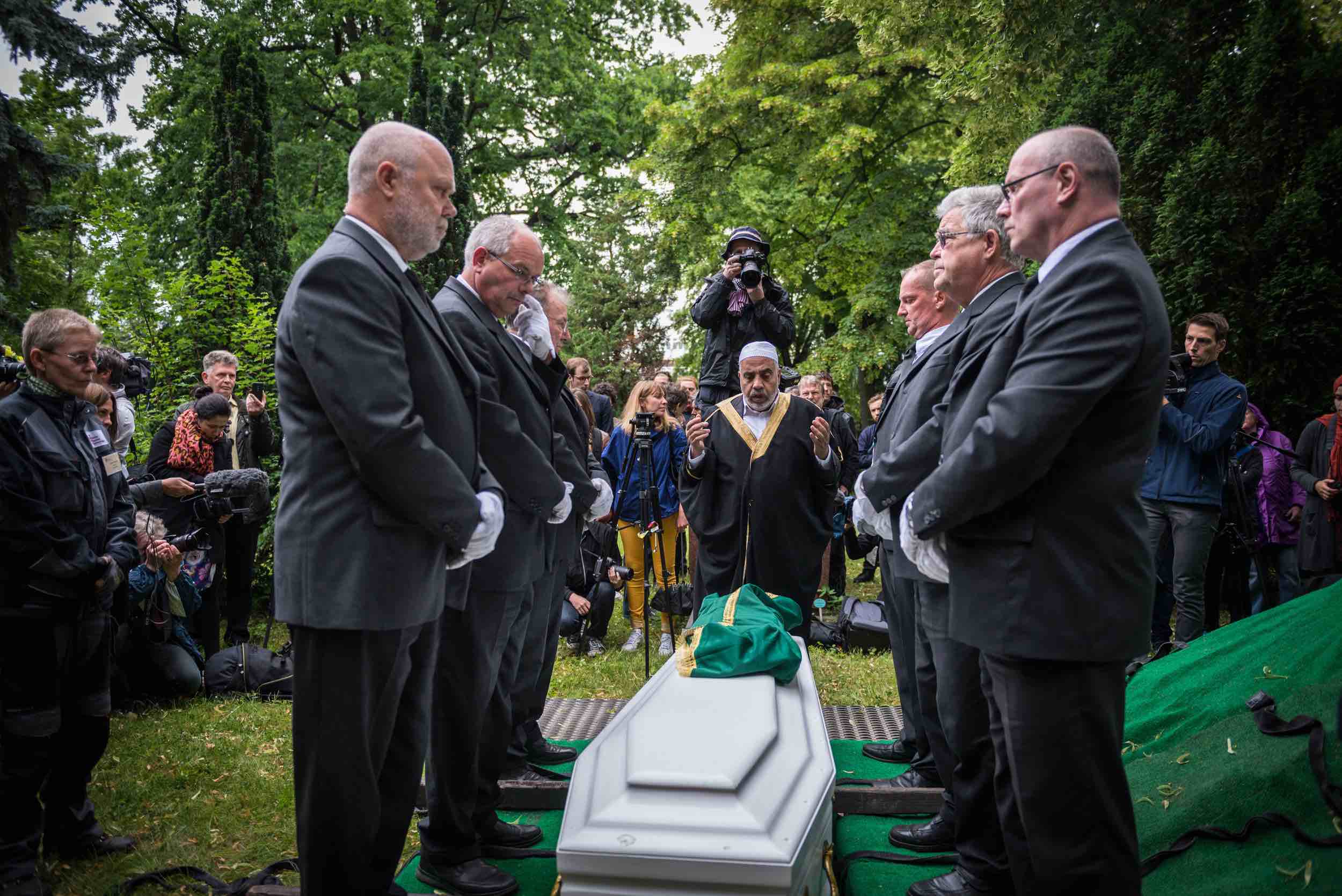
»Should art present solutions or is its role rather to ask questions in order to make the unthinkable thinkable? It is about the search for what is possible, for what seems too good to be true. One example would be a cemetery in front of the German parliament commemorating dead refugees. Another example would be a society that respects the dignity of everyone and not just that of its own citizens.[...] It is not up to art to lead the way in this direction, that would be making politics. And even if the CPB makes politicised art, it still remains art. And art thinks about a goal, not the path towards it.«

»What does it tell us if Europe buries the bodies of those who came here like pieces of dirt? It seems pretty easy to turn a blind eye to this suffering. There are no dead refugees here in Germany. The Center for Political Beauty uses this vacuum for another spectacular intervention. The attention they gained justifies the means. It is not this intervention that is cynical. Cynical are those who have to literally stumble upon bodies to hopefully realise that refugees are not a statistical parameter but people who have a right to our support.«

»The choice of the means used is what makes the difference: a human rights organisation would have to provide documents in order to proof the credibility of their claims. A group of performers acts within the realm of the imaginary. The artists are playing with forms of presentation, constructs of reality and exaggeration. And leave nothing left to be desired when it comes to the clarity of their message.«

»Maybe our routine, our getting-used-to pictures of the suffering at Europe’s external borders needs exactly such moments of shock.«

»It is about breaking with our society’s rituals of conscience, shattering the shell of political rhetorics and countering the modified pictures in newscasts with different images. It is about holding responsible a criminal way of doing politics and asking who is to blame.«

»For German dramatist Heiner Müller, the most important task of theatre was to excavate the dead ‘again and again’. For him, theatre was a place for evoking the dead: in theatre, those who live are able to meet the dead instead of suppressing them and what was done to them.«

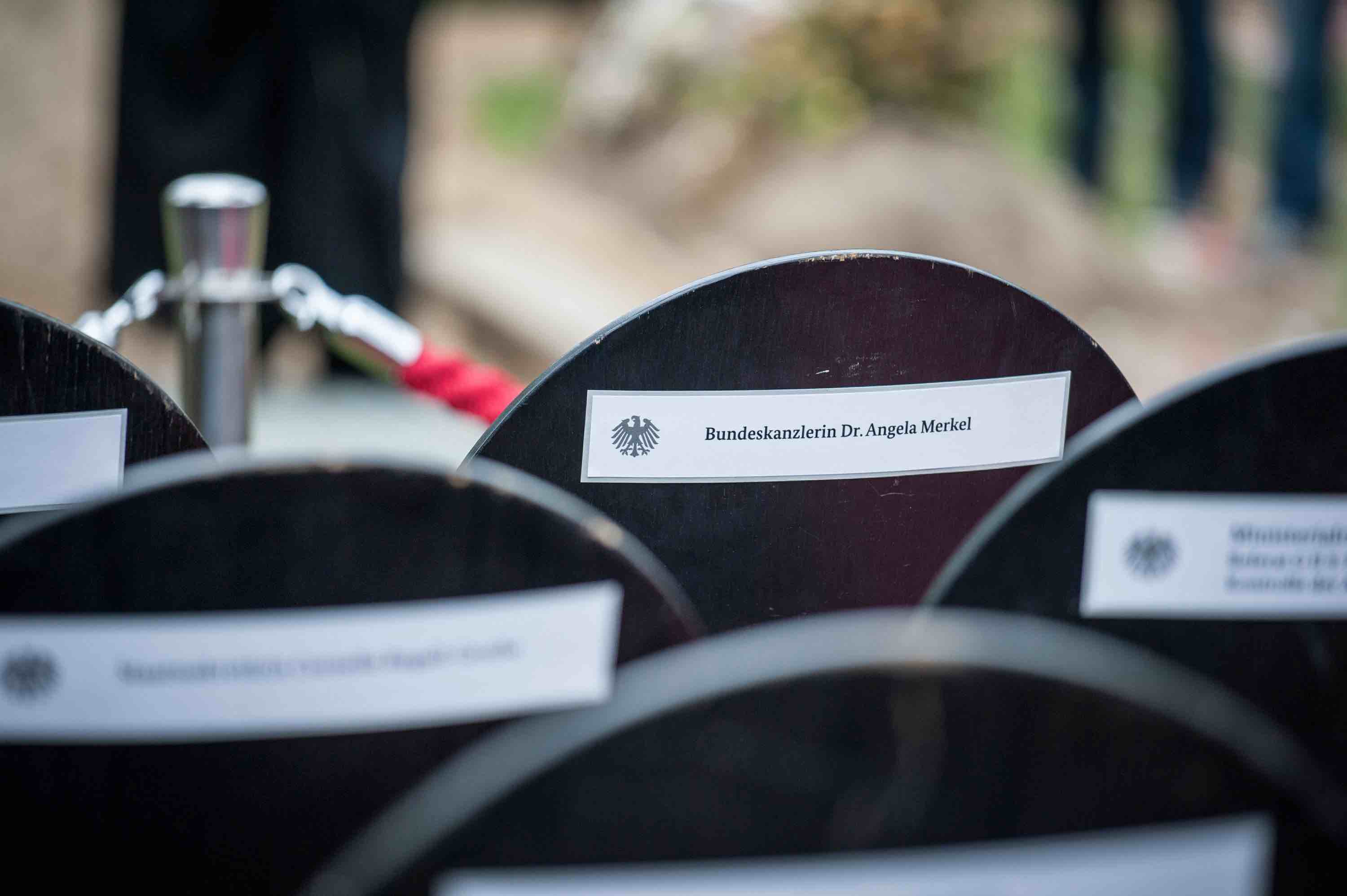
We invited politicians to the funeral. Members of the government, Secretaries of State and representatives of the Federal Ministry of the Interior were all on the guest list. The seating arrangement was fixed in advance: Federal Minister of the Interior Thomas de Maizère with his wife and Chancellor Angela Merkel in the front row. Their eulogies had also been prepared beforehand.
NY Times Migrant’s Funeral in Berlin Highlights Europe’s Refugee Crisis
The Local Activists begin wave of refugee burials in Berlin
The New Statesman Burying the Syrian dead in Berlin
Vice Activists Shame German Government by Burying Corpses of Migrants in Berlin
Washington Post Why migrants who drowned in the Mediterranean are being buried in Berlin
Newsweek Group reburying boat migrant remains in Germany after ›inhumane‹ treatment
Al Jazeera ›The dead are coming‹: Germans dig mock graves for migrants who died at sea
Daily Mail Syrian mother daughter died crossing Med reburied Berlin
Artnet Controversial German Art Collective Buries Deceased Migrants in Berlin
DW Exhumed and reburied: political group lays Mediterranean victim to rest in Berlin
hyperallergic.com Death With Dignity: German Collective Reburies Deceased Migrants in Berlin
en.qantara.de Creative activism in Berlin on the refugee crisis - »The dead are coming«
euphrates.org The German art of death and politics
theglobebandmail.com Activists, artists bury migrants who died trying to reach Europe in Germany
expatica.com ›The Dead Are Coming‹: Berlin activists bury refugee killed at sea
opendemocracy.net From a watery grave to a Berlin plot
news.yahoo.com ›The Dead Are Coming‹: Berlin activists bury refugee killed at sea
berlinlogs.com Dead Bodies Remind Germany of its Responsibility
kaput-mag.com In praise of collective action
i24news.tv ›It is easier to come to Germany as a dead migrant than as a live one‹
In Greece and Italy there is not enough space to bury the vast number of victims of Europe’s war of defense. We wanted to lay the foundations for a cemetery of superlatives in front of the Federal Chancellery: a memorial to the victims of Europe’s aggressive isolation placed underneath an arch that reads »To the Unknown Immigrants«.
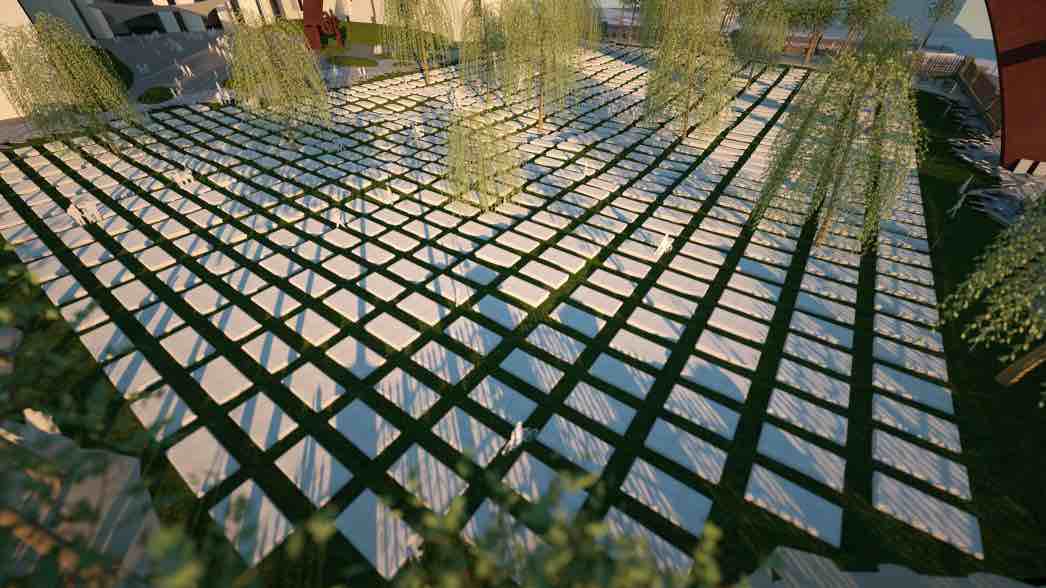
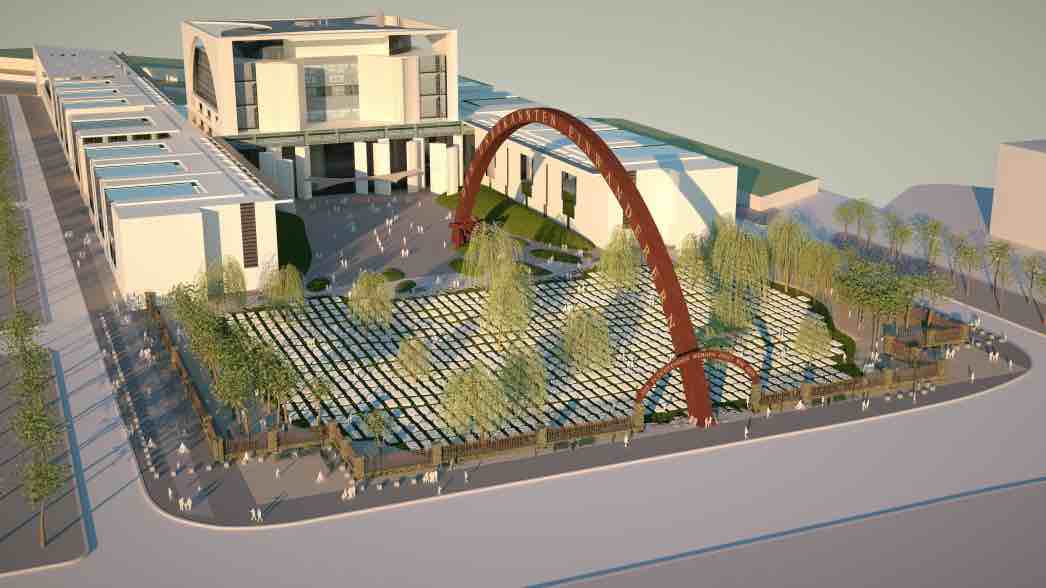
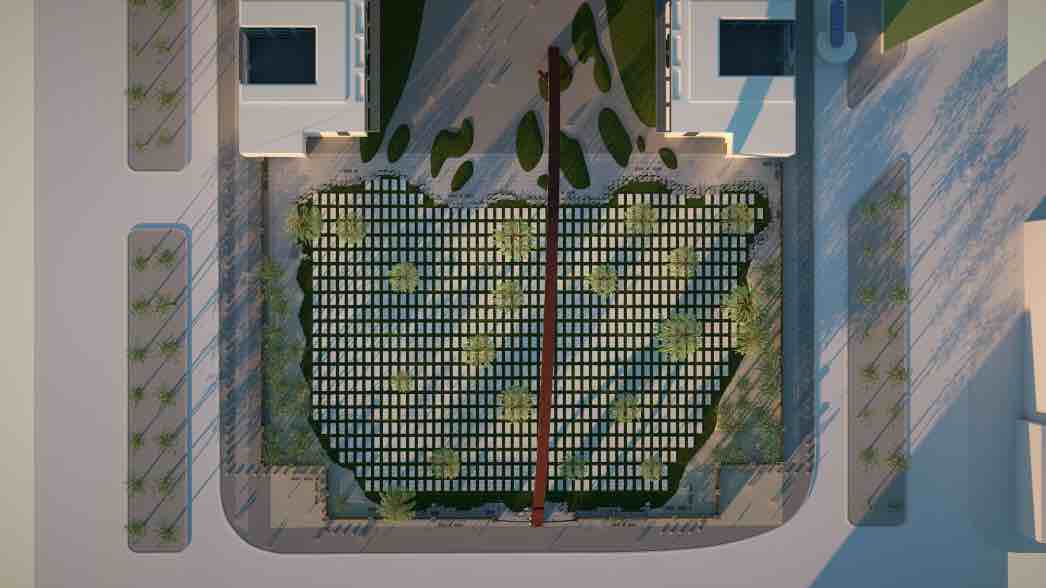
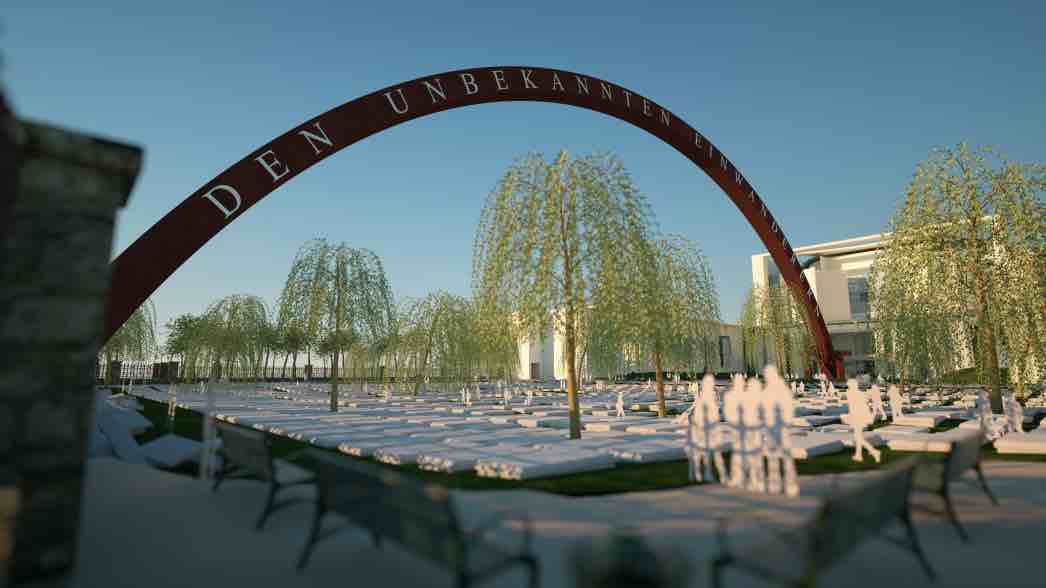
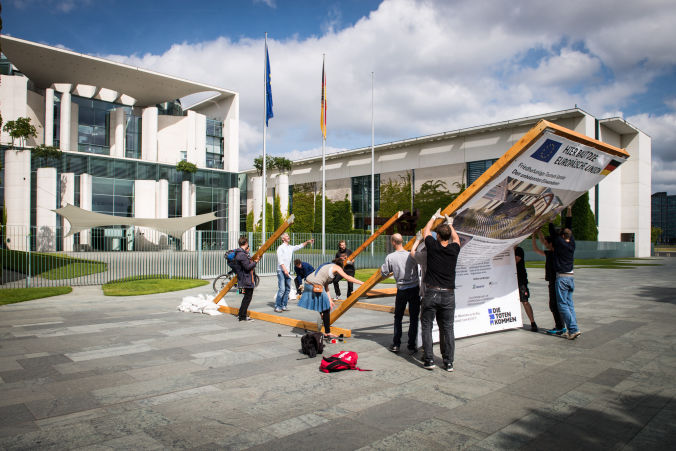
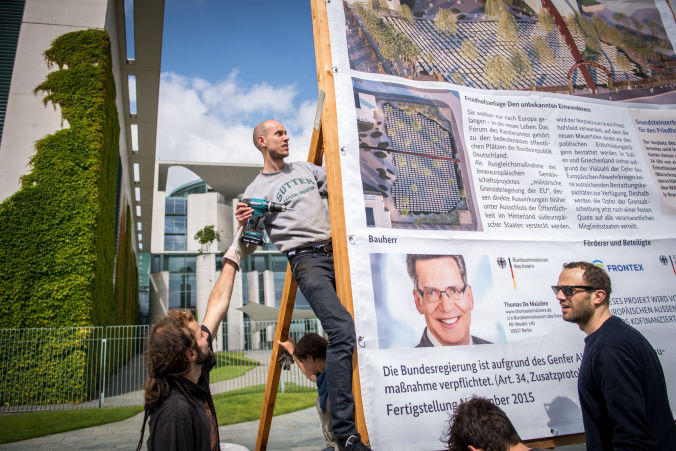
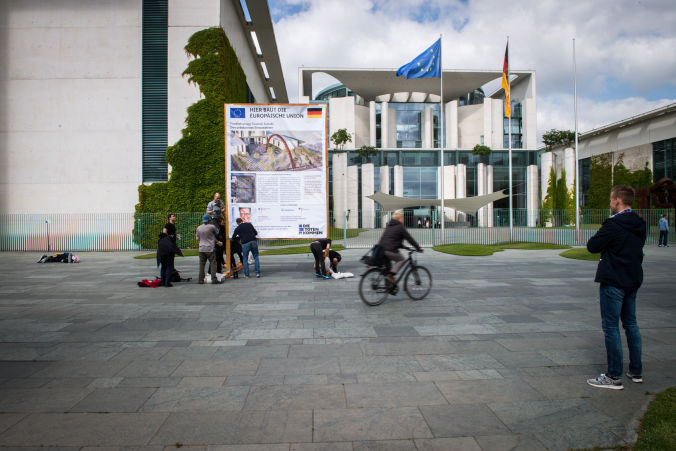
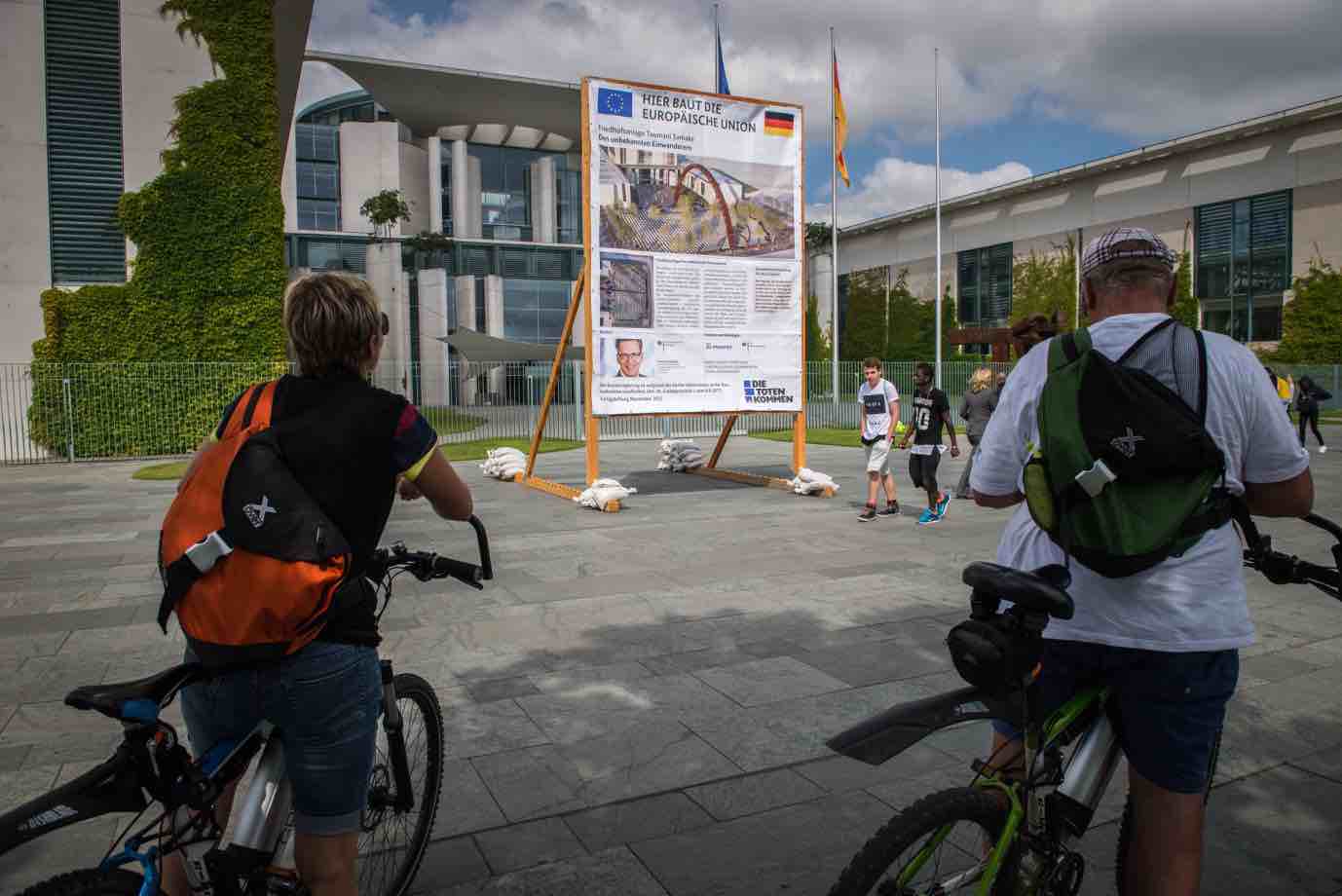
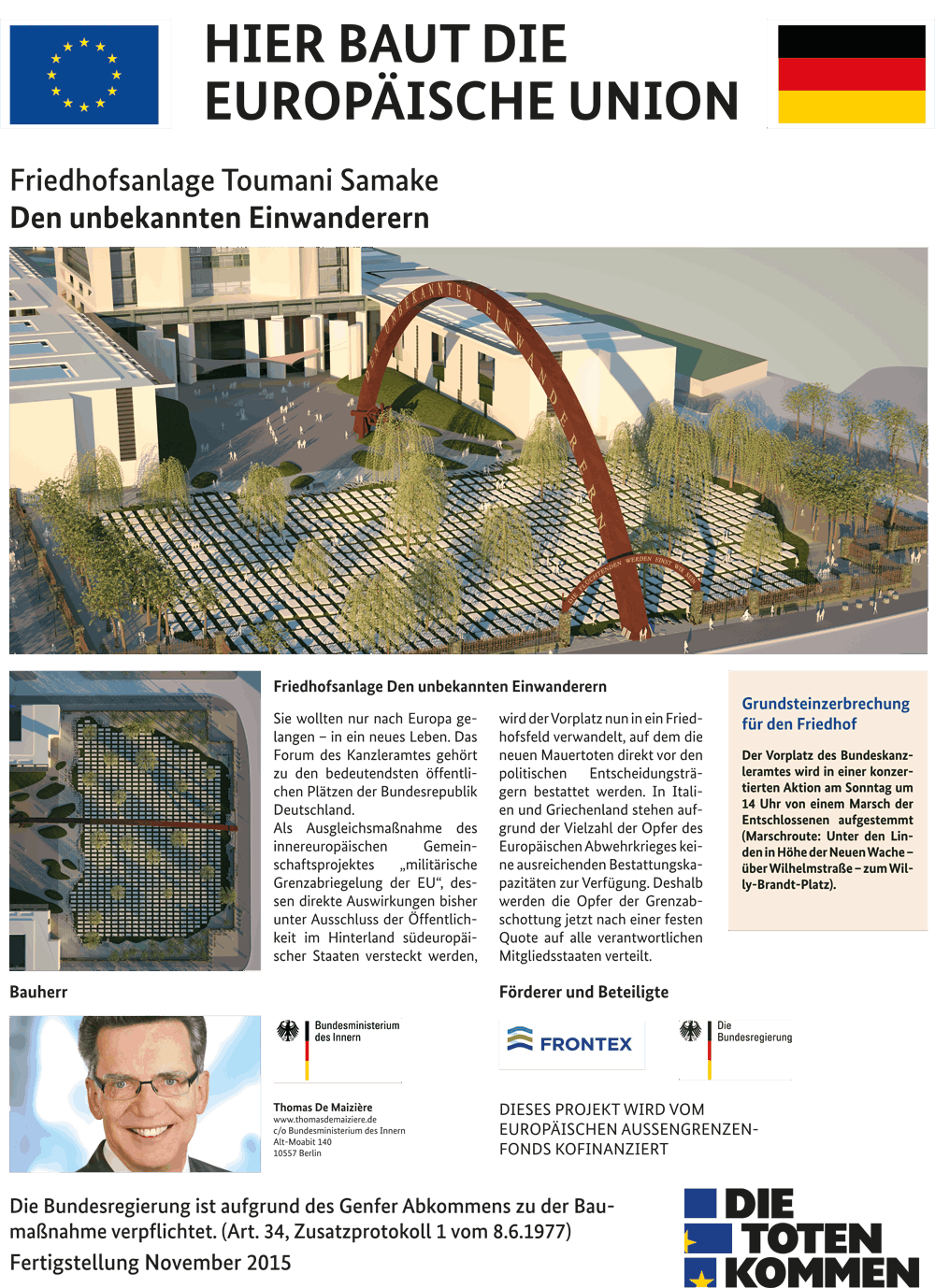
Chancellor Merkel, her cabinet and all visitors would have to walk over dead bodies in the most literal sense of the word.
Right after the idea for the cemetery had been announced, these determined members of our civil society set out to build it. They tore down the fence guarding the Parliament’s front lawn and dug hundreds of graves in an act of spontaneity.
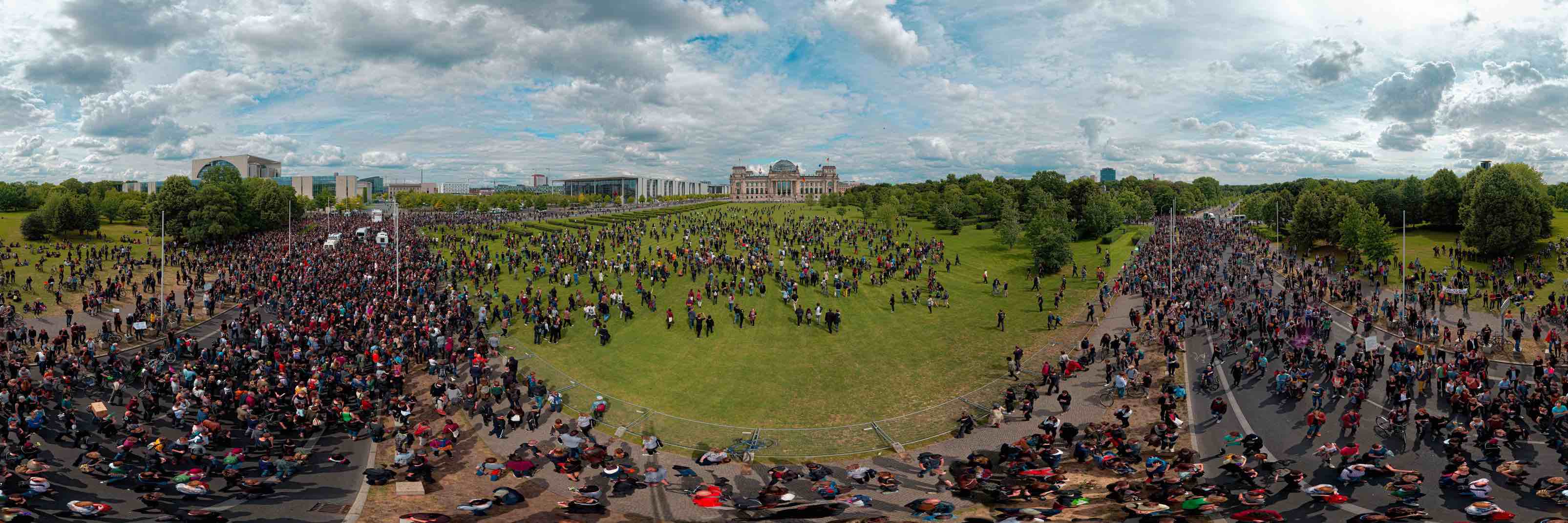
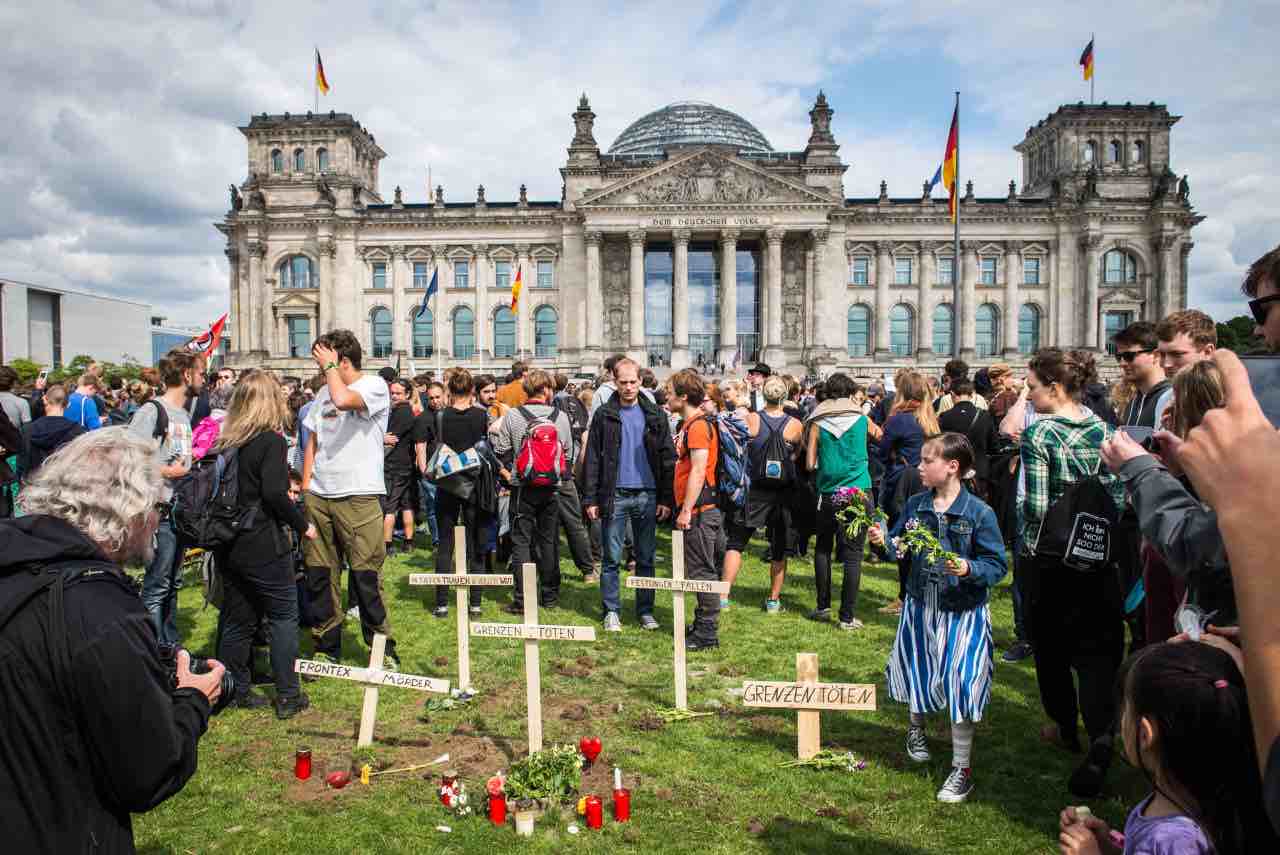
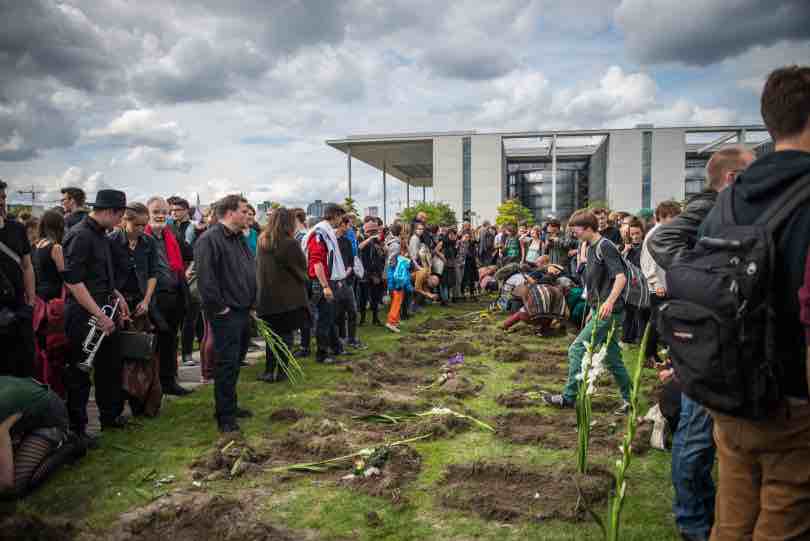
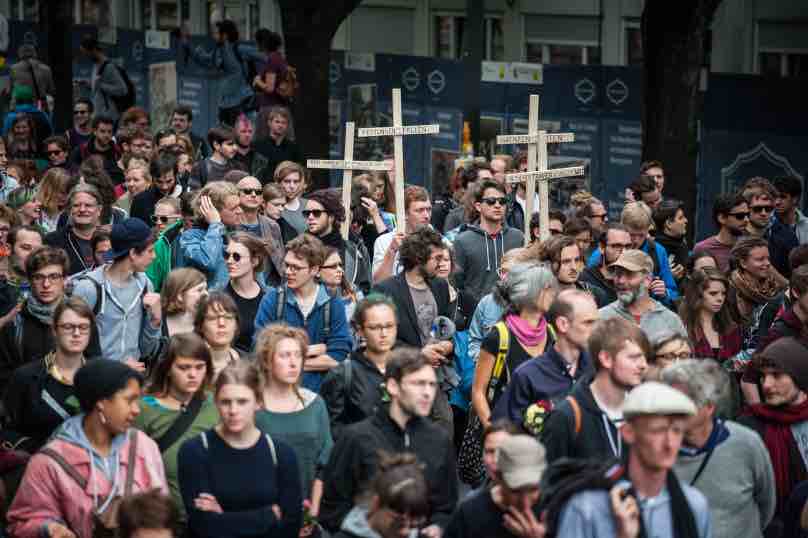
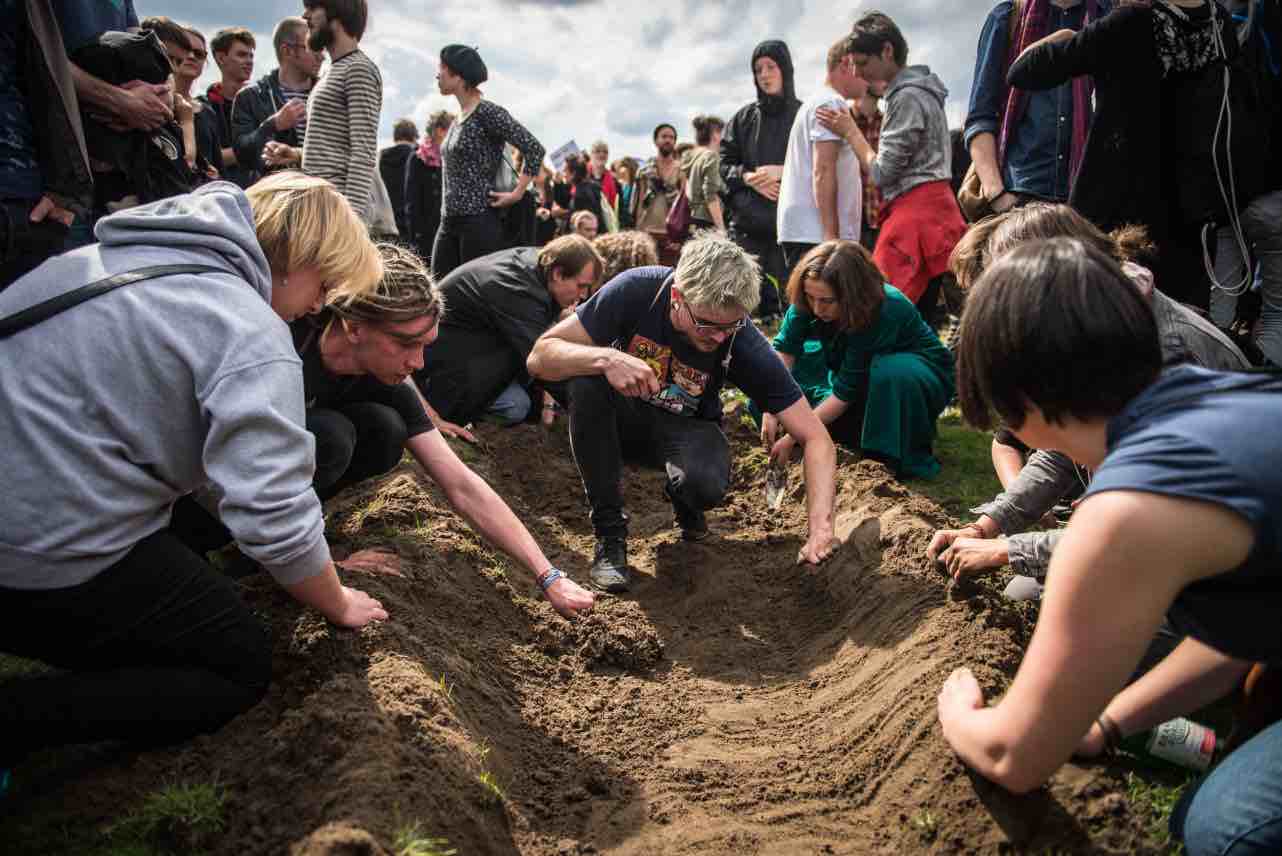
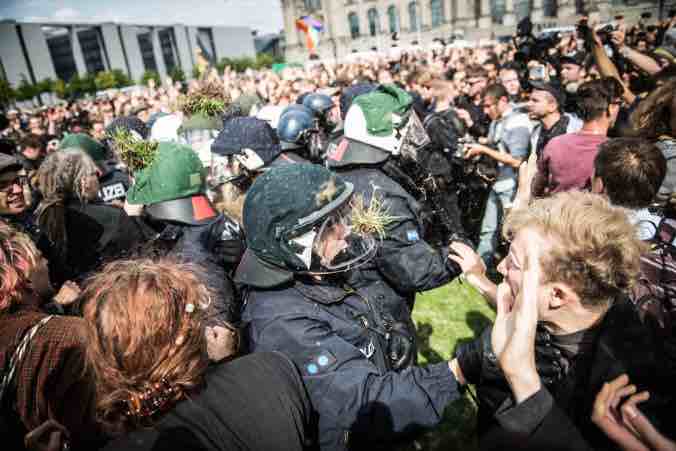
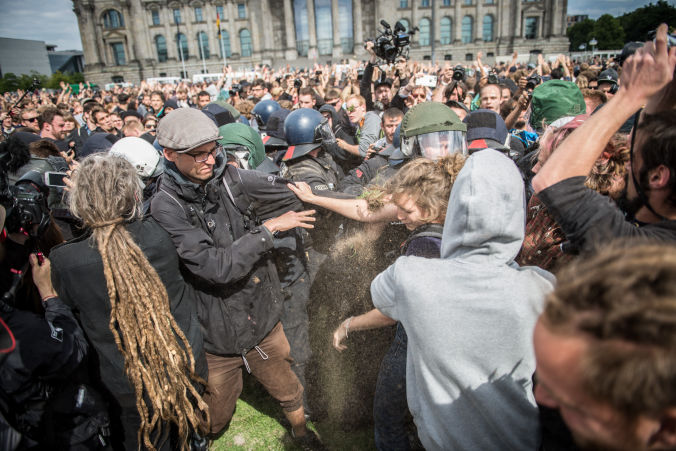
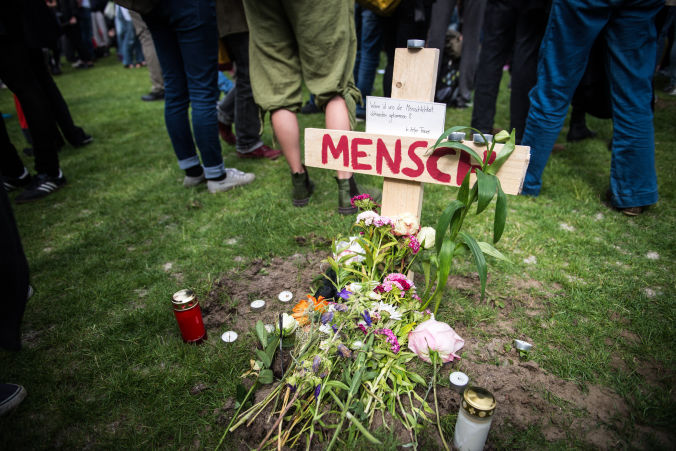
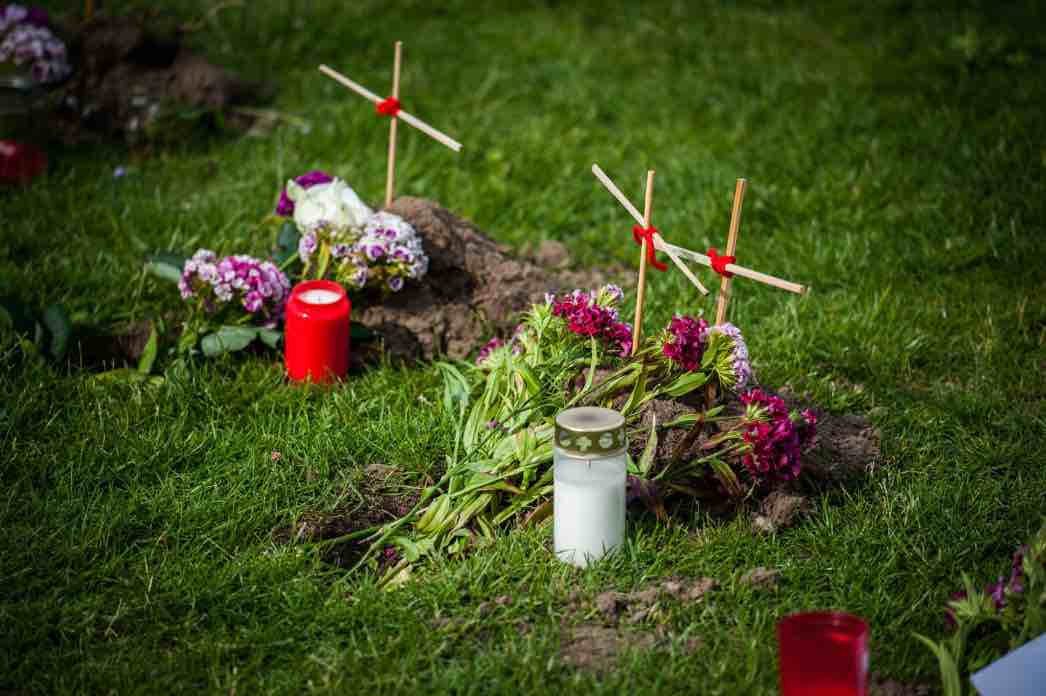
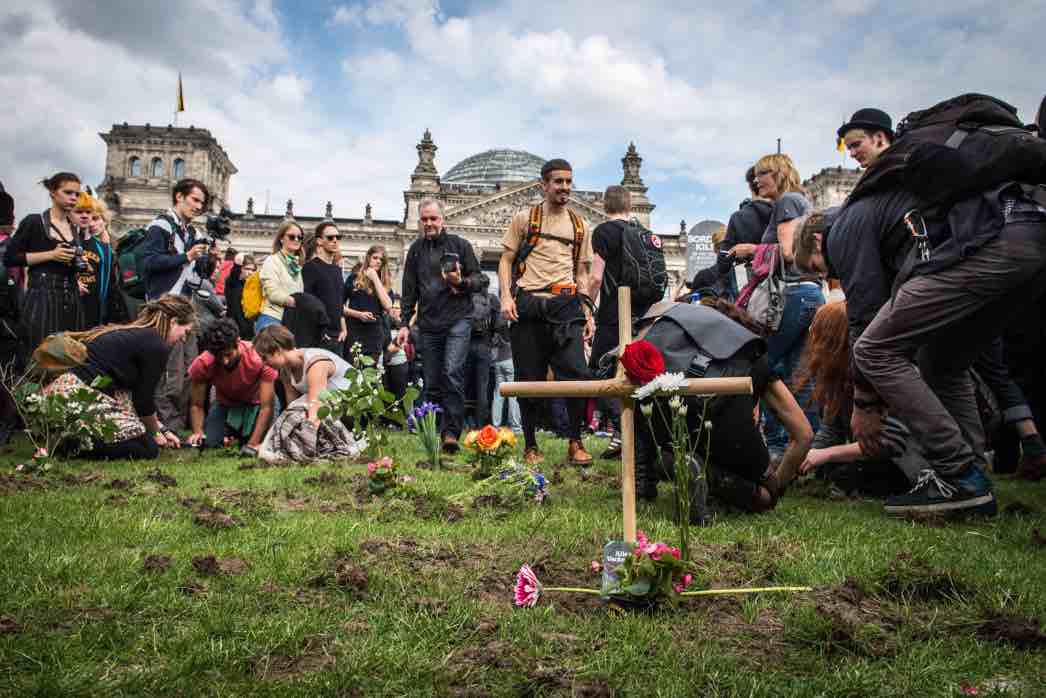
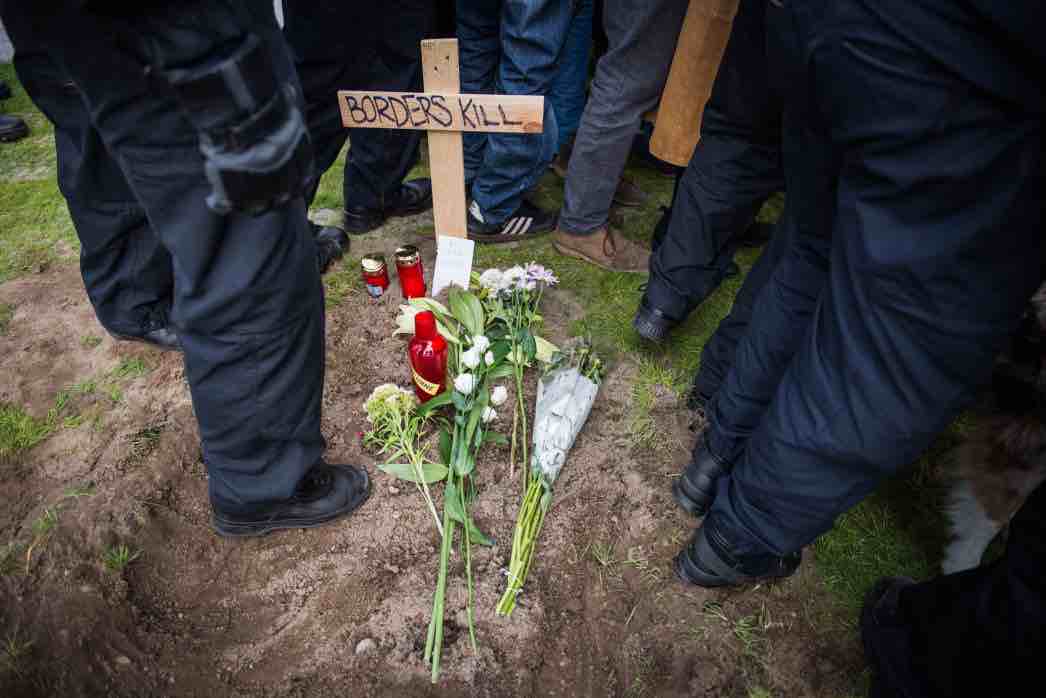
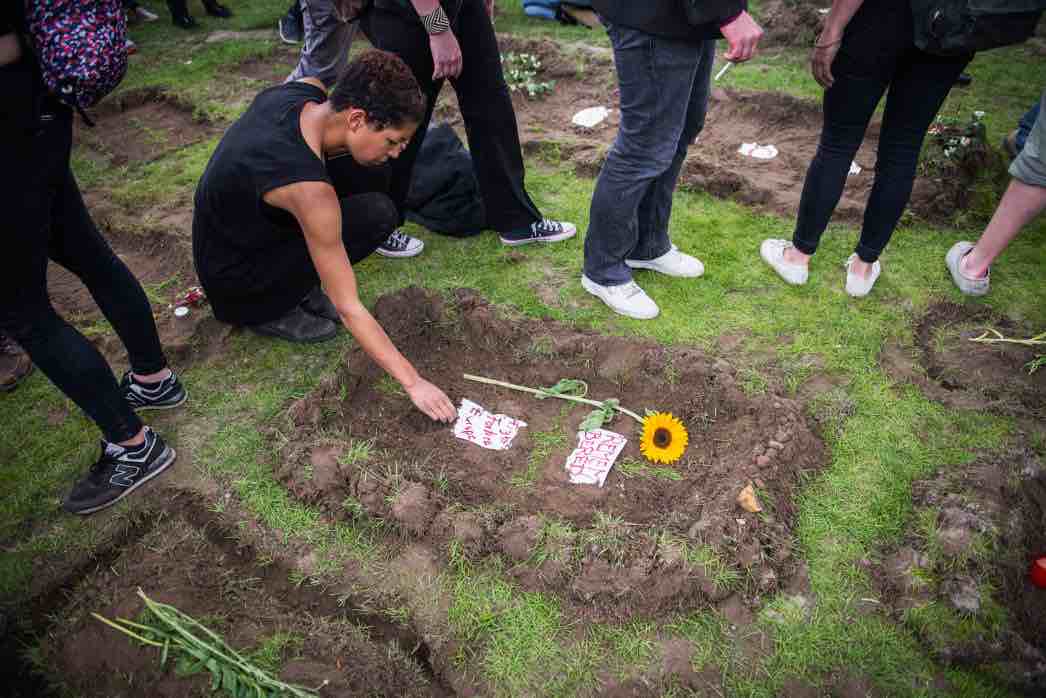














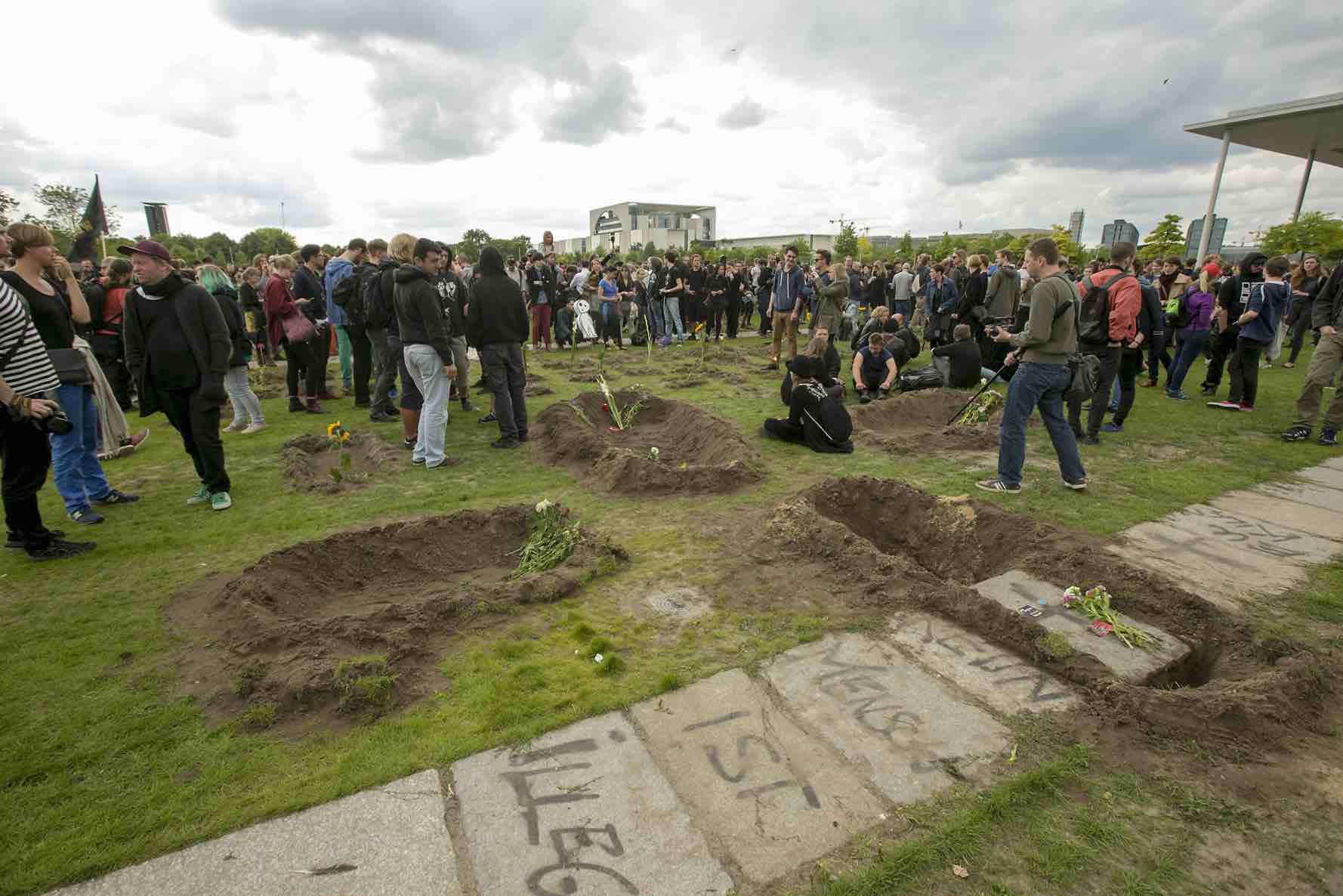
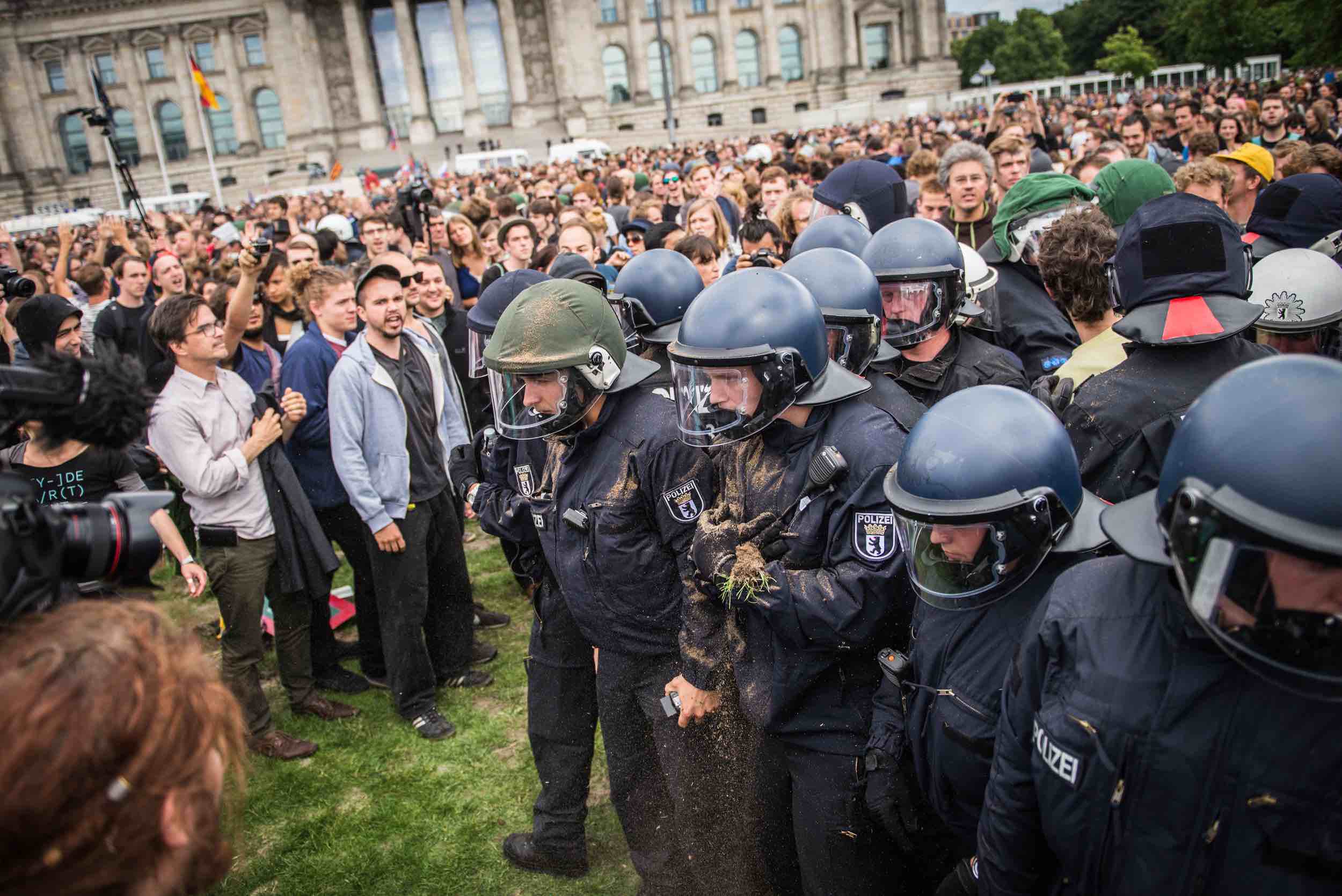
The lawn in front of the parliament turned into an improvised cemetery for the unknown immigrants.


Björn Höcke has praised the Center for Political Beauty as a »terrorist group«. Get close to the action and become an accomplice to a terrorist organization so far sadly recognized only by Höcke, Erdogan, and the Free State of Thuringia! As an accomplice you will make an invaluable contribution to inciting public unrest in the service of aggressive humanism. Nowhere else will you receive more unrest and dissent for every donated Euro.

»If we look at The Dead are Coming with a bit of distance, we can see a complex picture that German philosopher Walter Benjamin would have loved: through an act of political beauty - the burial - public attention is drawn to the intervention which is then used as a call for people to participate in a March of the Determined. The only purpose of the march is to create a new and stronger symbolism: the decentralised and unorganised digging of symbolic graves all over Germany. It is impossible to reject criticism that the collective was being too pleased with themselves any more clearly. As central as the CPB was in the beginning, as insignificant it now is for their intervention’s continuation. For some days or weeks more graves will appear all over the place - maybe even in the hinterland of Western Pomerania. Seeing as death is sacred, these graves will get draw everyone’s attention - even that of a pensioner in Western Pomerania. When he sees a grave on his local market square, he will be taken out of his daily routine and he will know: People are dying. And there is someone who mourns them. The Center for Political Beauty has created art in the style of Walter Benjamin: dissociated from the artist, inherently bearing in it the possibility for reproduction, politicised art.«

»›The March of the Determined‹ marks the Center for Political Beauty’s quantum leap: suddenly, the fence came down. It fell slowly, almost in slow motion. And five thousand people turned almost simultaneously in one soft movement, took down the fence and occupied the lawn in front of the German parliament. The proposed memorial took on a new form. Extras had turned into actors. But they continued to stick to the script except for the fact that they now built the memorial themselves. Indecision turned into determination. This magical moment of self-determination was made possible by the CPB’s specific and well-thought out invitation to take part in the performance. The decisive impulse of the day, however, was wisely left to the participants themselves. With the precision of an opera choir, five thousand people decided to take action and created a work of art on the lawn, eternalised by thousands of pictures on the internet. The fence that could not be cut in Bulgaria, came down in Berlin. Participants no longer confronted the Chancellery but - as a more logical consequence - the Parliament, the place where a new approach to refugees must be devised and adopted.«

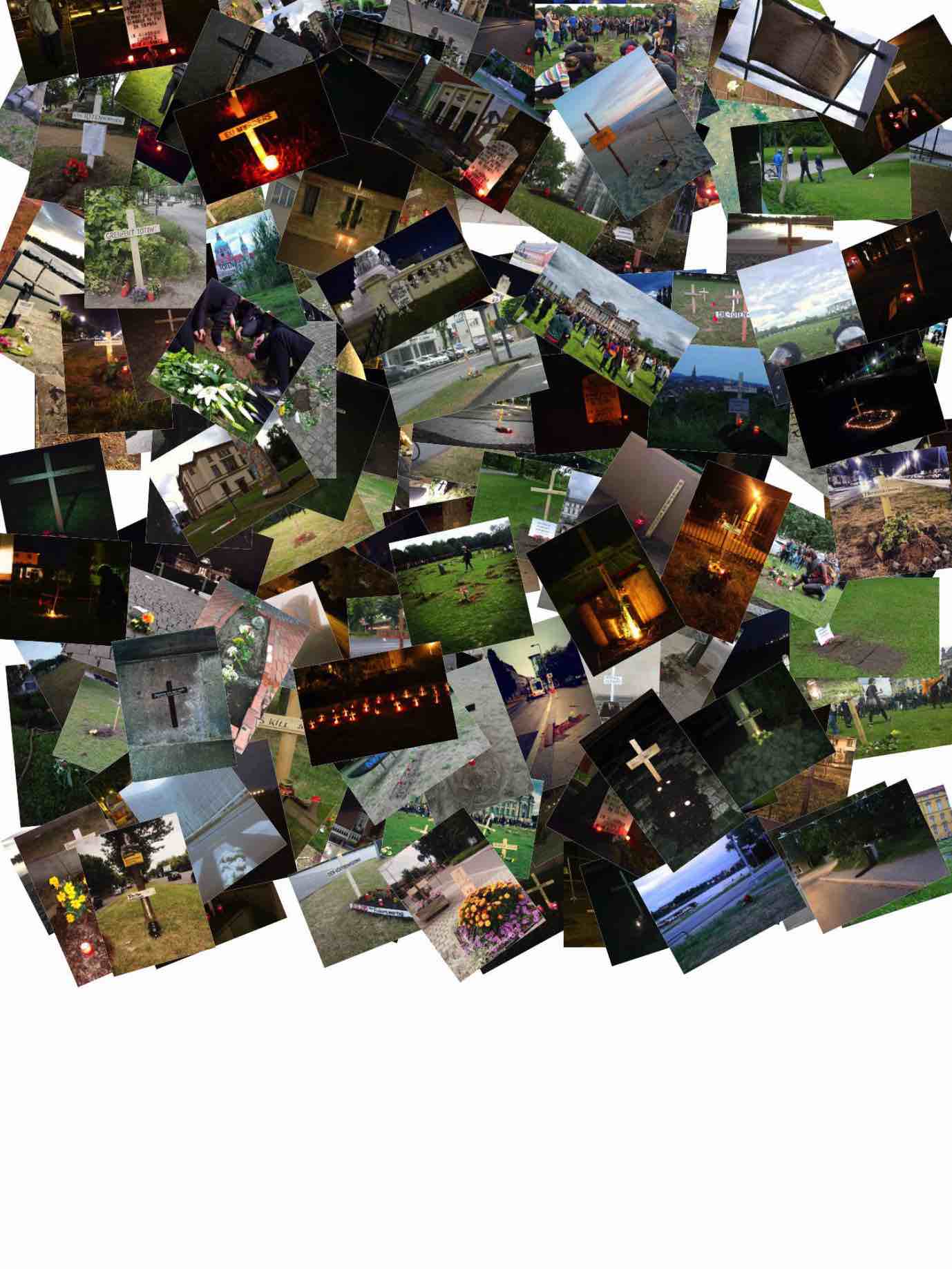
Since then, thousands of graves have been dug in cities all over Europe.
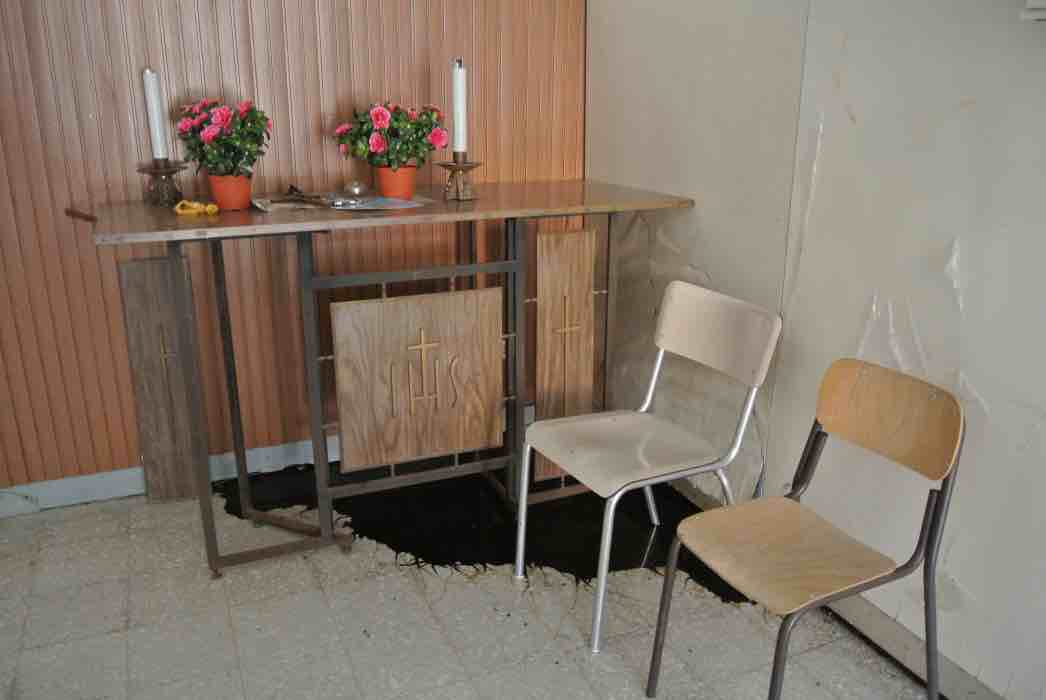
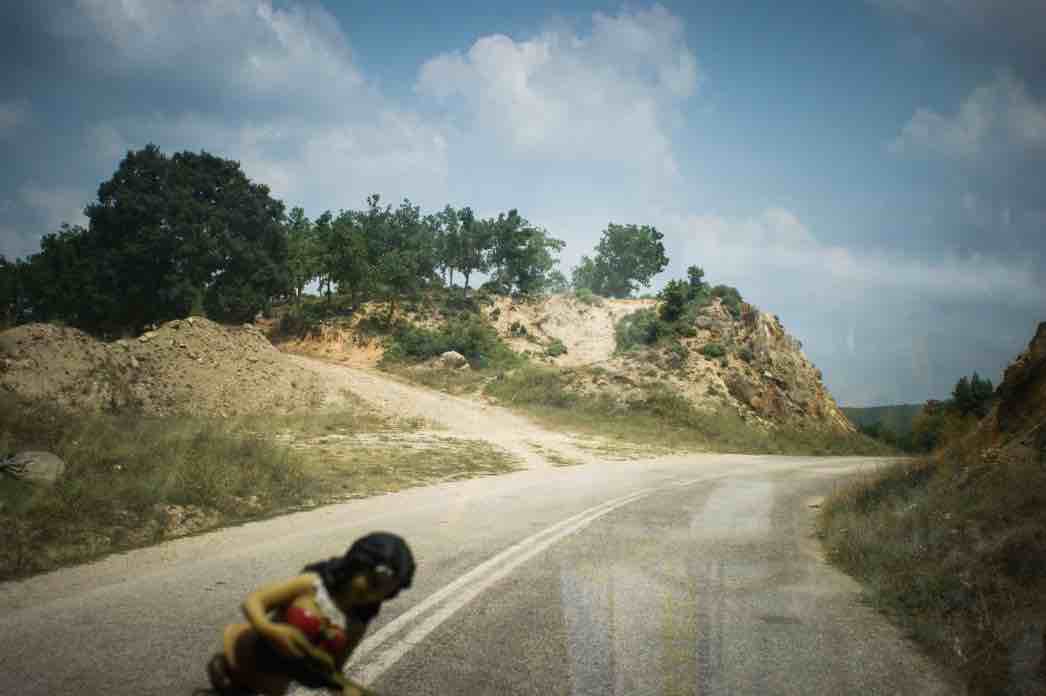
Sample 1: On 30 May 2015, the media reported the discovery of 17 bodies. This time, however, we were prepared to show the people of Europe what happens to the victims’ bodies. At first, they were put into coffins and displayed at the harbour. Then, they were packed into garbage bags and thrown onto a pile in hospital cooling chamber. Against every form of decency. These are pictures that you were never meant to see. The black puddle on the floor is the leaked blood from 17 people. We won’t show you what it looks like inside the cooling chamber. German newspaper »taz« decided to find out more about the story behind the pictures.
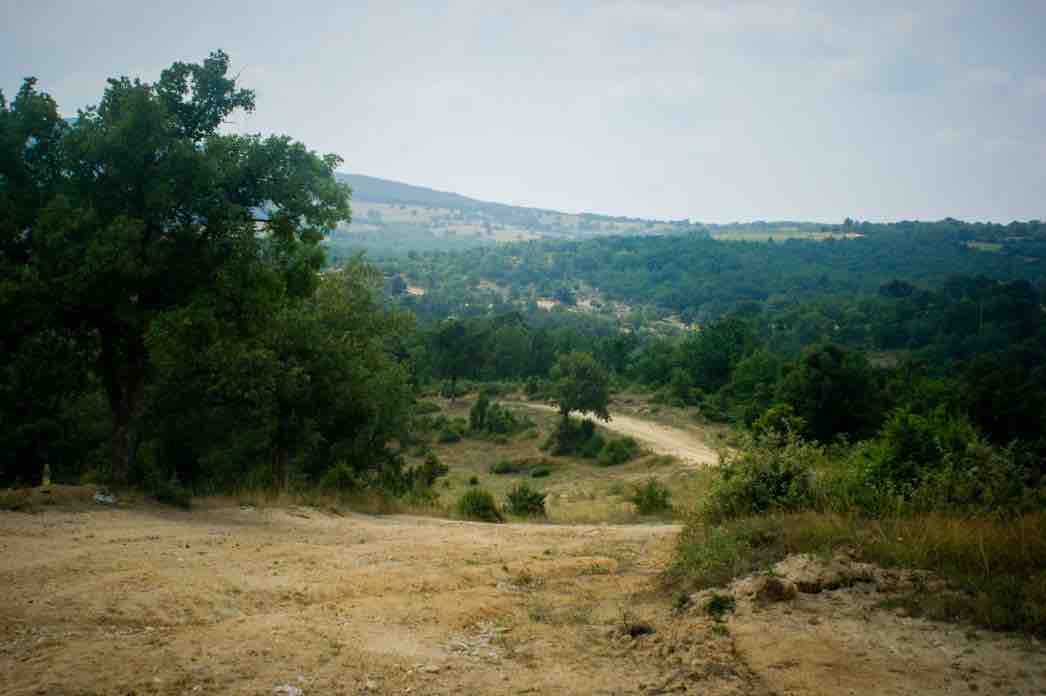
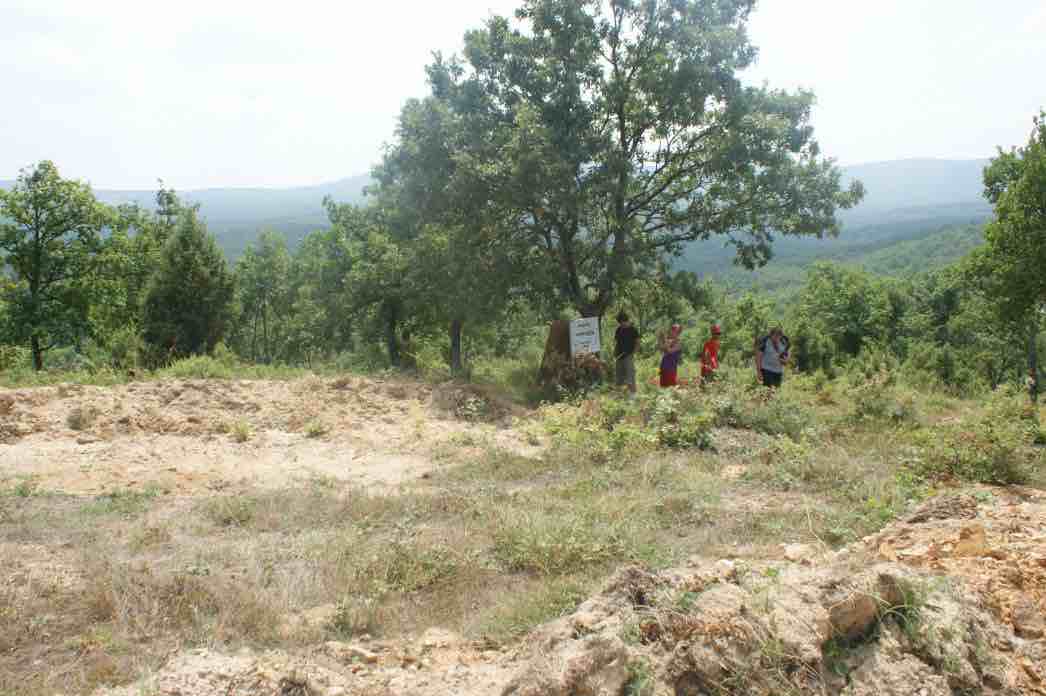
Sample 2: Sidiro, Greece: in August 2010, German activists discovered a mass grave with more than 200 bodies. Women, children and men who drowned trying to cross the heavily guarded (at the time by German police) border between Greece and Turkey. Even though the local government had stipulated that the deceased should be washed and buried according to Muslim traditions, the undertaker buried the corpses alongside a sandy path in the Greek hinterland - where they lie to this day. Later on, authorities simply declared the site a cemetery.
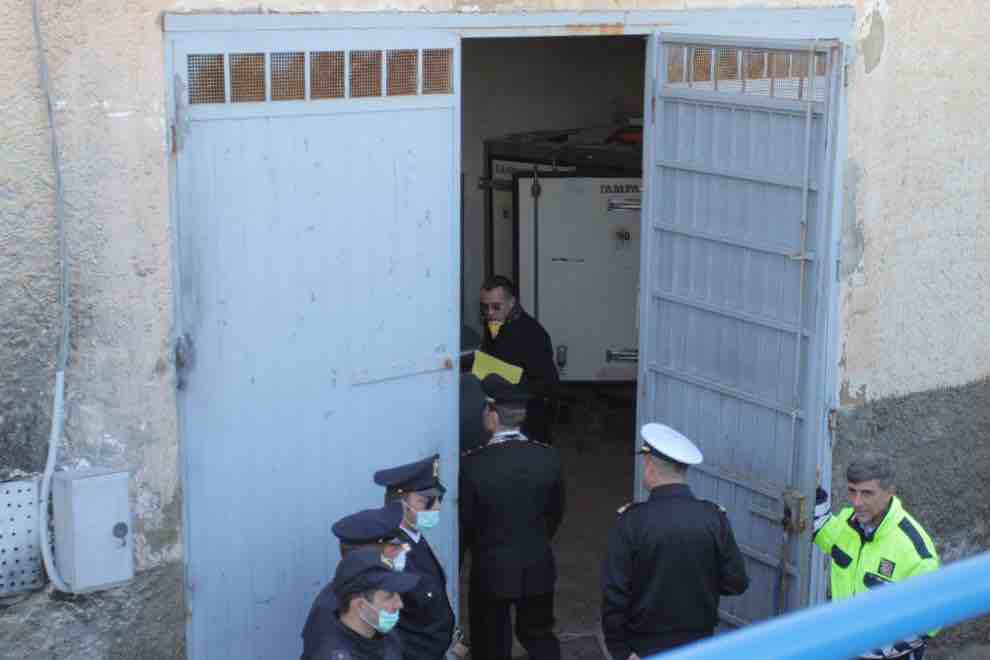
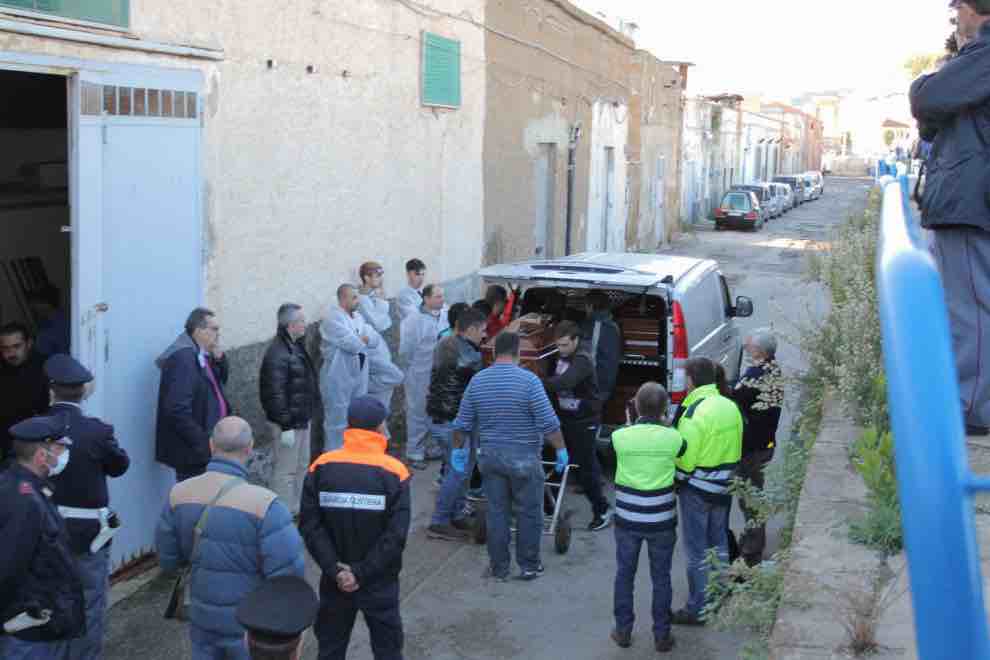
Stichprobe 3: 22 January 2015, Catania, Italy: 13 missing persons’ bodies were discovered in a storage hall in Sicily, among them two children. Due to »bureaucratic obstacles« the bodies had been lying there for eight months.
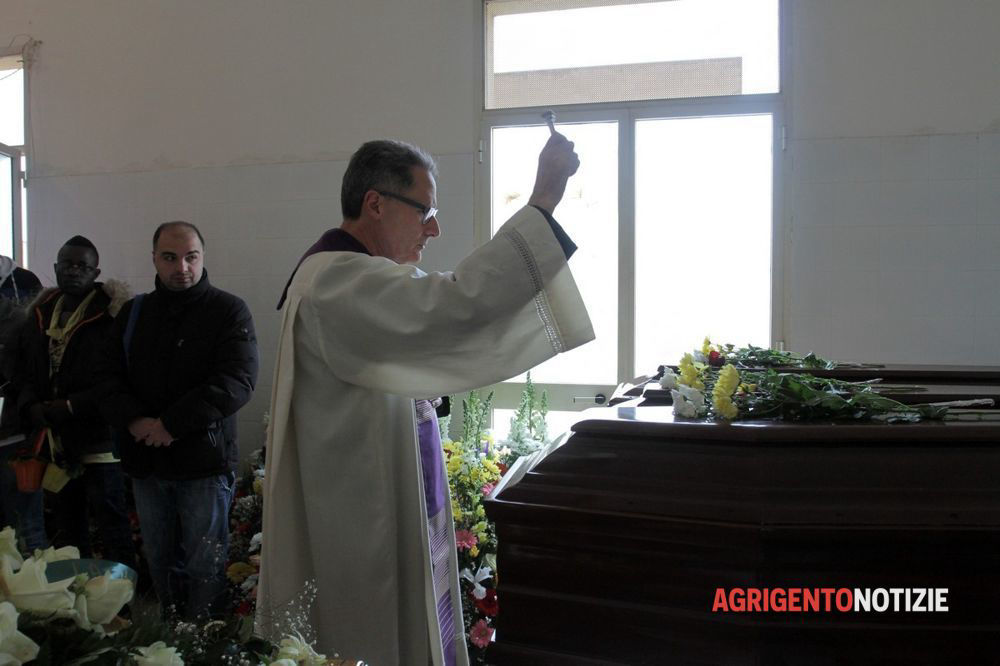
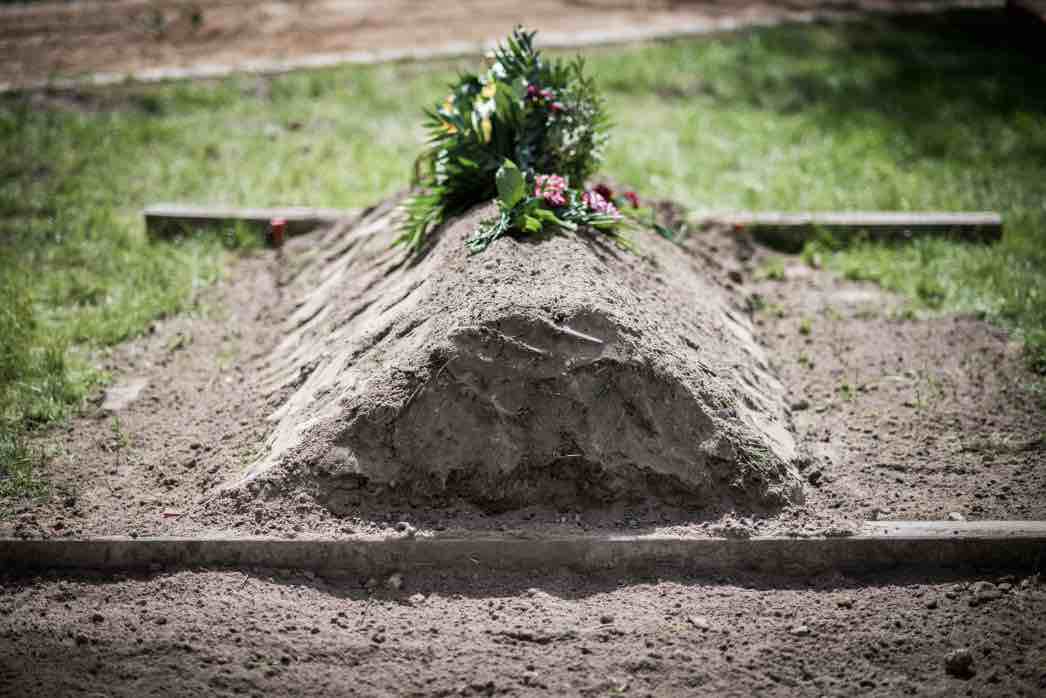
Italy’s mayors were desperately looking for political support. In Greece, victims are buried according to Muslim traditions. In Italy, they receive a Christian burial. As early as 2013, the Eritrean community complained about the burial practices. So far nothing has happened.
»We believe that every person killed at the wall of Europe is one too many. After politicians have turned these people into statistics, you have turned these numbers back into people. Thank you.«

»With all due respect for humanitarian work: such interventions cross the boundaries of piety.«

»Making dead refugees the object of an art performance is disconcerting and without regard for piety.«

»Those who talk about lack of piety should go to Europe’s external borders.«

»Describing these work of arts as controversial means to compliment them. Debates on such interventions are desirable. Society should be glad that it still has such a potential for protest with which artists can make their art visible.«

»These people don’t flee simply because they feel like it. They are looking for life, life which they themselves were denied. I call on all politicians: these are people who needed our support and continue to need our support now. We must prevent this suffering. We also will drown. This woman drowned in the sea. But we are drowning in injustice, war, hatred, racism and discrimination. But together we are able to rescue ourselves.«

»I thought for a long time about what I should think about this intervention. But at the end of the day, it is all about the question: what is more perverse- an art performance that is very close to crossing the limits of taste and piety or the cynicism of the EU’s approach towards refugees which ignores the suffering of thousands of people and willingly accepts their death? The CPB has managed to demonstrate the hypocrisy and double standards of our social values. Why is the dignity of the victims being defended but that of those who are still alive despised?«

»I rarely run out of words but this intervention has left me speechless […] and yet I am trying to express my deeply felt speechlessness caused by your political art. I have been tied forever to theatre / art but this project is the strongest and boldest that I have experienced.«

»I am convinced that this intervention is one of the strongest forms of expression of political theatre in recent years, even though the occasion - the death of several thousands of people at Europe’s external borders - is extremely sad.«

»This intervention sheds light on what other people would have preferred to leave in the dark.«

»Many would find it extremely comfortable if the bodies would continue to be far far away.«

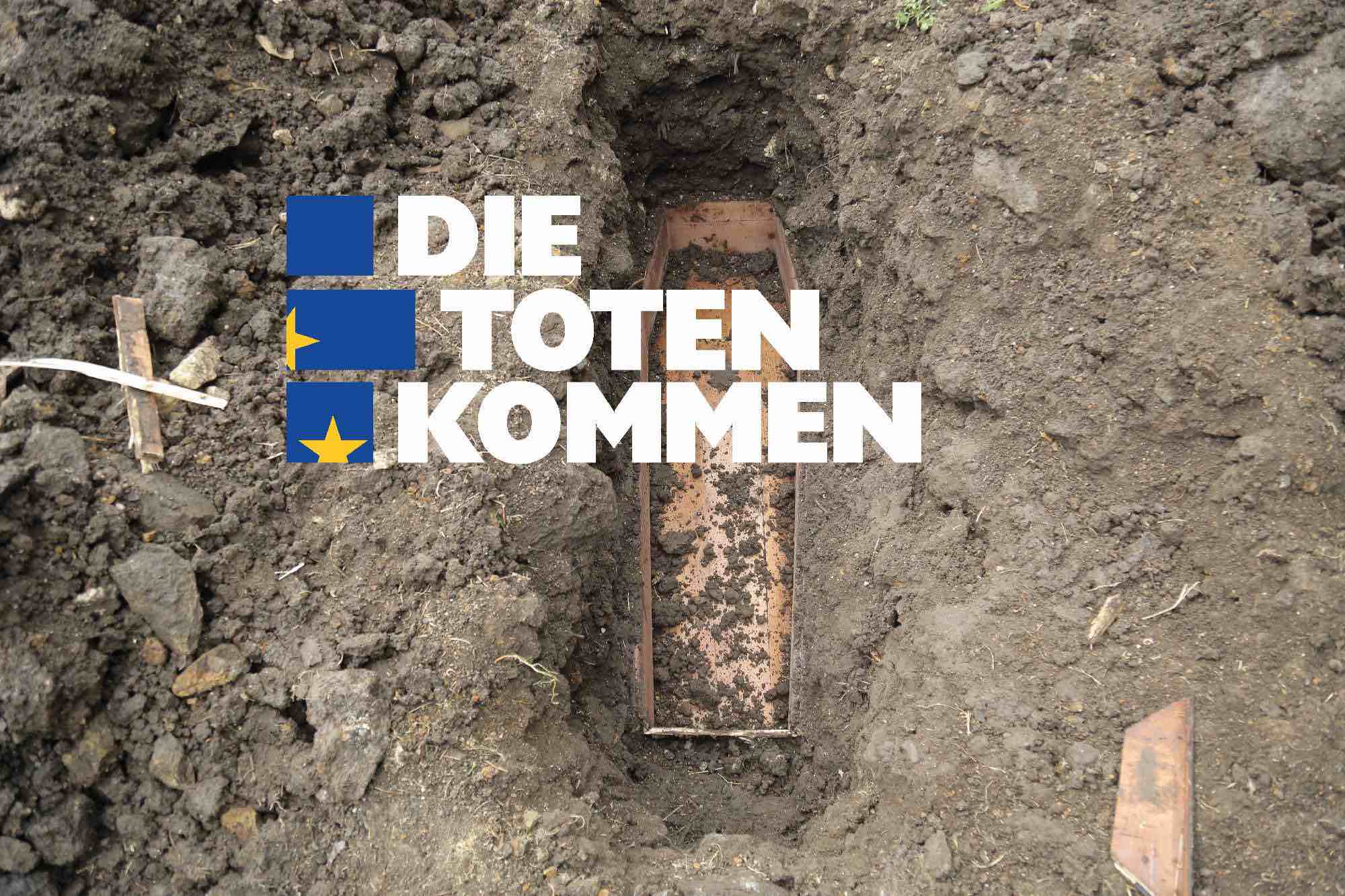
1. What is a corpse?
One speaks of a corpse when the vital functions are suspended, but the coherence of tissue is still present. As soon as the decomposition process dissolves this connection, one no longer speaks of a corpse in medical terms.
2. What process does a corpse go through?
Due to the decomposition process, a corpse »decays« over time. Bacteria and microorganisms first decompose the soft tissue and later the hard tissue. A corpse that has already been buried decays in 10-15 years, in clayey soils after 50 years, depending on soil conditions, temperature and other external influences.
3. How does a dead body behave in salt water?
We have talked about this question with a whole series of forensic doctors and forensic scientists at institutes in Leipzig, Hamburg and Berlin. A congruent picture has emerged from the answers: A dead body quickly sinks and disappears without a trace. At the bottom of the sea, it is decomposed by animals and microorganisms. The whole body, including the bones, dissolves completely. Often within a few days. All experts agreed that the number of unreported deaths in the Mediterranean must therefore be far higher than suspected.
4. What happens to people who arrive dead in Italy?
The authorities in Italy are overburdened, the cemeteries completely overcrowded. This situation applies to deceased Italians as well as to refugees. The dead are distributed from the Mediterranean directly to free cold storage places in various municipalities. The deceased have to wait up to several months stacked on top of each other for a burial place. Since the communities have to pay for the burial costs, the funerals are kept very simple. Near Catania in Sicily, numerous bodies lie in storage cells for months. In 2014, the mayor of a Sicilian municipality complained that the municipal cemetery had only two cold storage cells. According to the mayor, these are constantly occupied and are not sufficient due to the many new bodies.
We spent half a year contacting mayors, municipalities, cemetery administrations and pastors in Sicily to understand this process. In the process, we came up against a wall of silence. Countless phone calls that were abruptly hung up. Denial and feigned cluelessness. The request to please not call again. This behaviour made us suspicious. Why so little transparency and openness? A closed system with mistakes that should not be made public?
5. Are the dead identified?
No, many deceased are just a number. They are buried unknown, without relatives, without friends. The home countries and relatives are neither identified nor informed. A special commissioner for disappeared persons has been installed by the Ministry of the Interior, but he mainly takes care of Italian missing persons. Official partner organisations of the special representative also only act on a national level and have nothing to do with refugees and the situation in the Mediterranean. A German Higher Administrative Court ruled on 29 April 2008 (NRW, 19 A 3665/06) that it is a serious violation of human dignity to bury the dead without informing the relatives. The right of relatives to care for the dead enjoys constitutional status.
6. But DNA samples are taken, aren't they?
We wondered if DNA samples were systematically taken from everyone who died. For decades, all victims of border closure were buried unknown, no DNA samples, no hope for survivors to ever get certainty about what happened to their loved ones. After a boat accident on 3 October 2013, the call for genetic recording grew louder. What the situation actually is today is unclear. Many authorities claim that DNA samples would be taken, many NGOs doubt this statement. What is certain is that the evaluation and matching of DNA material takes years. In the meantime, people continue to be buried only as numbers, often in so-called cemeteries of the »nameless«. Even large organisations like the International Red Cross only take action when a request is made with DNA samples from relatives in the country of origin.
7. How will people be buried?
After many deceased have been lying in cold cells for months, they are buried. Without the presence of relatives. Very simply and without flowers. A burial according to the customs of their religion and culture does not take place, say representatives of various communities. In Greece, deceased refugees are buried Muslim, even though there are many Christians among the Eritrean refugees; in Italy, Muslims are often buried Christian - with priests spreading incense over the coffins. In 2013, the Eritrean community complained about the state of affairs and asked the Italian state to release the bodies so they could be transferred to Eritrea. Nothing happened, the bureaucratic hurdles were insurmountable.
8. Who collects the names of the deceased refugees?
Our research has shown that the number of unreported deaths in the Mediterranean must be much higher than generally assumed. There is no official body that collects names of the deceased and if there is, it is inaccessible to the public. Journalists make a great contribution in documenting names. UNITED is an NGO that evaluates media reports across countries and compiles a list of names and characteristics of refugees who died in the Mediterranean.
9. How are the relatives identified?
Not at all in Italy. DNA samples are taken. Only if the relatives in the home countries also give DNA samples can these be matched at all.
10. How are refugees buried at the Greek EU external border?
In August 2010, a mass grave with over 200 bodies was discovered in the mountains of Sidiro. Women, children and men who died crossing the heavily guarded Turkish-Greek border. Although the order from the district government stipulates that the deceased be washed and buried according to Muslim customs, the funeral contractor buried the bodies along a sandy path in an inaccessible and completely unmarked area near the town of Sidiro. This is how Europe deals with its dead. Afterwards, the wayside was legalised as an official refugee cemetery, where well over 450 dead now lie.
11. How quickly must a body be buried after death has occurred?
There is no information on this in the German burial law. A corpse may be buried 48 hours after death at the earliest, the limit towards the back is not specified by law.
12. What happens to missing persons abroad?
The Federal Foreign Office recommends first filing a missing person's report with the local police station. According to the BKA, German nationals living abroad or staying there as tourists can be reported missing abroad. In these cases, the Federal Criminal Police Office is informed via the respective German mission abroad (embassy or consulate) or the Interpol service of the country. The Federal Criminal Police Office's Missing Persons Unit informs the German police station responsible for the place of residence about this missing person case and asks for appropriate checks. If the whereabouts of the missing person cannot be established, the further processing of the case is carried out by the competent German police station. Among other things, it collects identification material (photos, fingerprints, dental records) of the missing person and makes this available to the foreign Interpol office via the State Criminal Police Office and the Federal Criminal Police Office. If necessary, the Federal Criminal Police Office will involve other states in the search for the missing person.
13. What happens when a dead German is found abroad?
After the post-mortem examination by the doctor, the death is reported to the competent local authority, usually the registry office. In the case of all deaths of Germans abroad, the registry office I in Berlin is also notified. It may be that the local police inform the relatives directly or that they hand over this task to the German mission abroad, which informs the competent German police authority.
